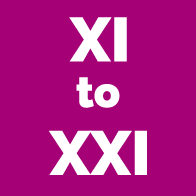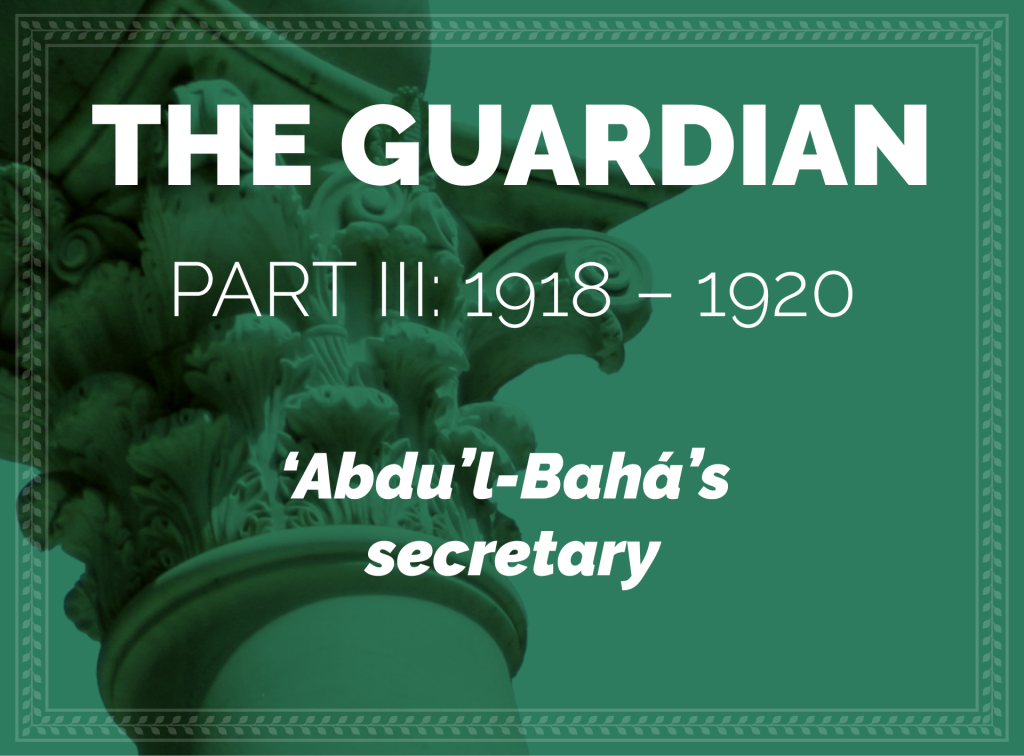
Written and illustrated by Violetta Zein
This part covers the life of Shoghi Effendi from the age of 21 in 1918 to the age of 23 in 1920.
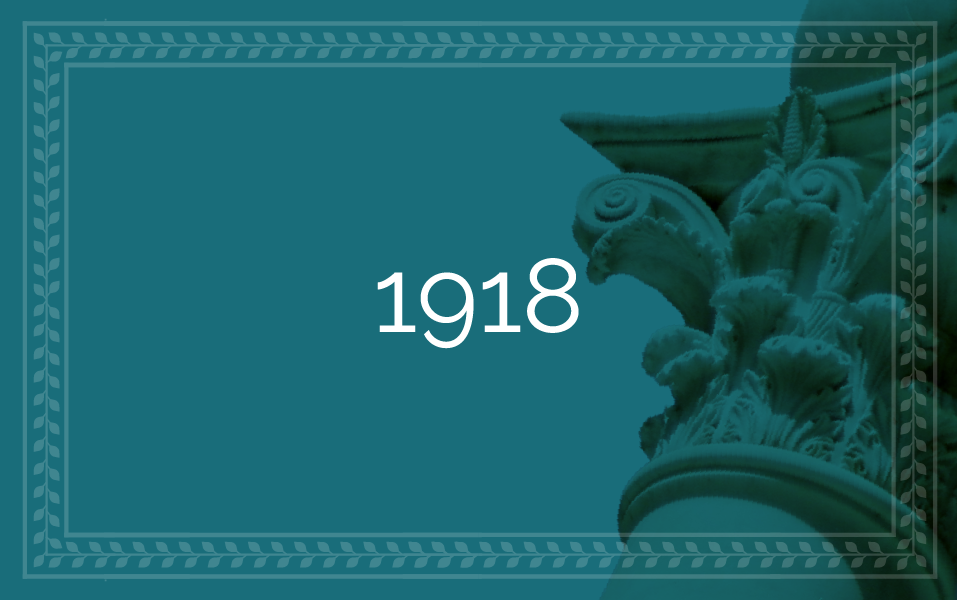
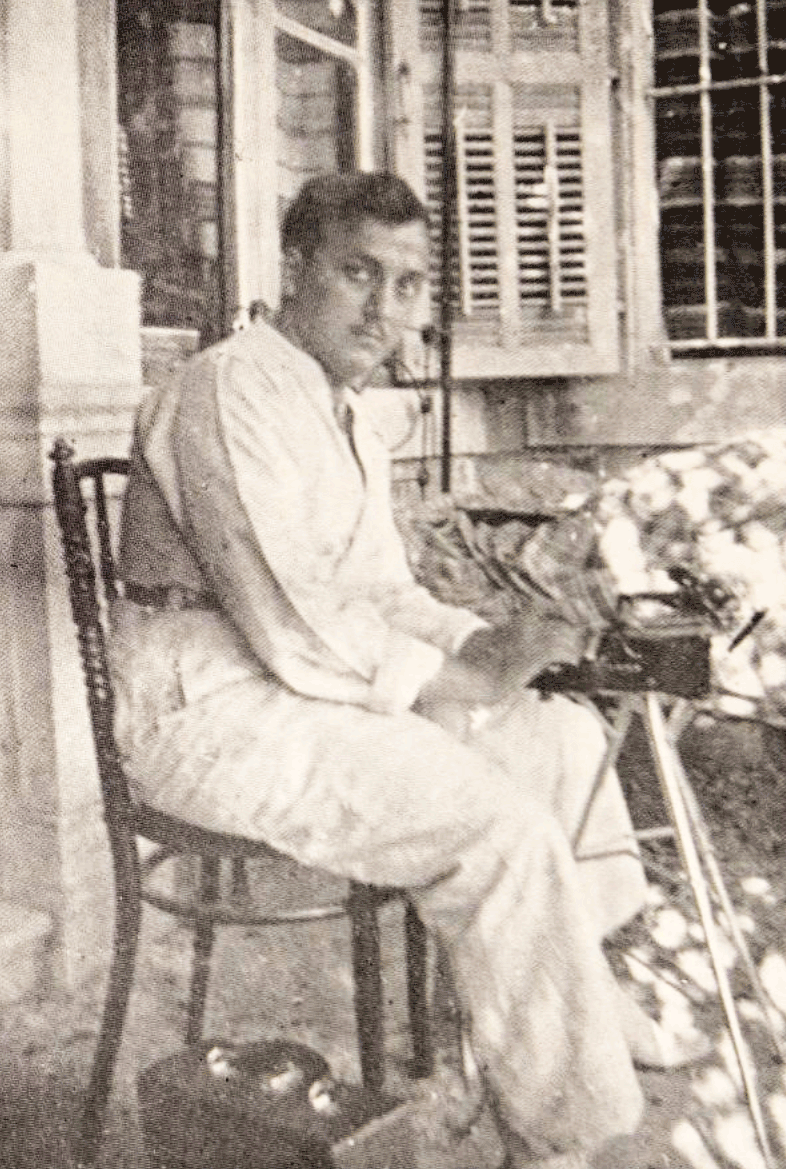
Shoghi Effendi in the service of 'Abdu'l-Bahá, in front of his trustworthy Corona typewriter, on which he would later write many letters, translate The Dawn-Breakers, and compose God Passes By. Source: The Priceless Pearl, between pages 104 and 105.
From the time he arrived in the Holy Land, in the summer of 1918, and more so after Ahmad Sohrab left a few months later, Shoghi Effendi becomes ‘Abdu'l-Bahá's main English secretary, translator and assistant.
Shoghi Effendi’s 18 months of full-time service to his beloved Grandfather's, the ultimate goal he has worked untiringly throughout his six years of study in Beirut, were to be the sweetest period of his entire life.
Shoghi Effendi spent a tremendous amount of time in the presence of the Center of the Covenant and learned from ‘Abdu'l-Bahá precious lessons in encouraging believers and managing the affairs of the Faith. Later, speaking about being in the presence of the Master to his wife, Amatu’l-Bahá Rúḥíyyih Khánum, Shoghi Effendi would often repeat:
The Master was like an ocean.
This comment alone explains the mystery that is 'Abdu'l-Bahá. He had a superhuman capacity to absorb anything the world threw at him, a minuscule amount of which would have been too much and too overwhelming for the most courageous person to bear.
'Abdu'l-Bahá could endure anything.
He was an ocean.
He was undisturbed by anything. He could take anything, as much as the world threw at him, and show not the least sign of disturbance on the surface.
For about a year and a half, Shoghi Effendi would have a chance to observe 'Abdu'l-Bahá in every situation, and learn from him nearly 24 hours a day. Of course, the bulk of the work was translating letters into Persian and translating replies into English, but what Shoghi Effendi could observe was the way 'Abdu'l-Bahá responded to questions, and marvel at his Grandfather’s ability to love everyone, to respond to each individual, to never forget a heart, to always inspire, encourage, educate.
In his work as 'Abdu'l-Bahá’s secretary, Shoghi Effendi would get to know many outstanding and eminent Bahá'ís worldwide.
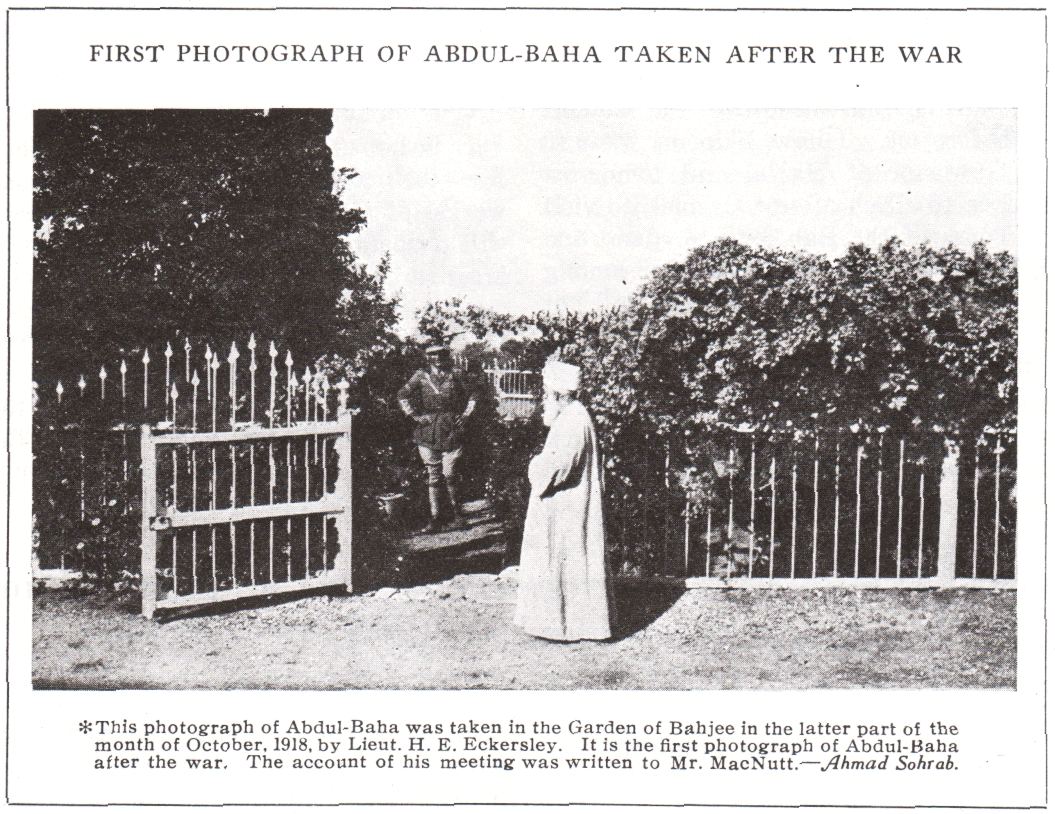
Lieuenant H. E. Eckersley took this photograph of 'Abdu'l-Bahá speaking to a British officer in the gardens at Bahjí at the end of October 1918. It is the first photograph of 'Abdu'l-Bahá after World War I. Source: Star of the West Volume 9, Number17.
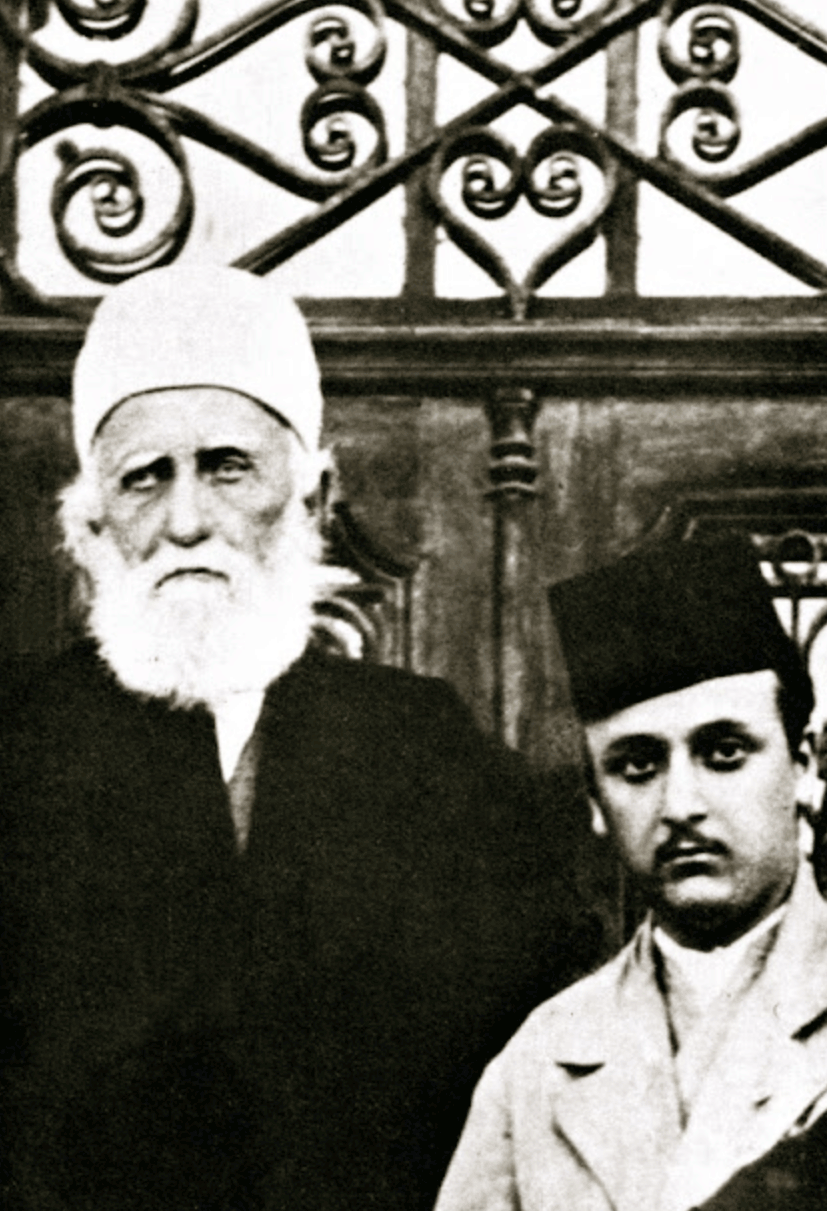
'Abdu'l-Bahá and Shoghi Effendi in front of the Master’s House at 7 Haparsim in Haifa. Source: 'Abdu'l-Bahá in the Holy Land.
Between 1918 and 1919, we begin to see the future Guardian emerging in full splendor through the deeds and words of Shoghi Effendi, enkindled and forged in 'Abdu'l-Bahá’s love, instruction and encouragement.
During these months, Shoghi Effendi was the embryonic Guardian: he was laser-focused on serving 'Abdu'l-Bahá, and entirely consumed by one single desire to make His grandfather happy, to care for his health, to burn up every ounce of his energy in service to the Center of the Covenant.
On 19 November 1918, Shoghi Effendi wrote a letter to a friend in England that showcases all these different angles of this single overarching facet of his life, and includes a concise analysis of where his life now stood, the Faith’s priorities and what the end of World War I meant for the immediate future of all Bahá'í endeavors:
I am so glad and privileged to be able to attend to my Beloved's services after completing my course of Arts and Sciences in the American University in Beirut. I am so anxious and expectant to hear from you and of your services to the Cause for by transmitting them to the Beloved I shall make him happy, glad and strong.
The past four years have been years of misery, of sever famine and distress, of unparalleled bloodshed and strife, but not that the dove of peace has returned to its nest and abode a golden opportunity has arisen for the promulgation of the Word of God. This will be now promoted and the Message delivered in this liberated region without the least amount of restriction.
This is indeed the Era of Service.
His nascent rhetorical style, still hampered by an imperfect command of the English language, but already showing the bare bones of its future greatness is reflected in passages such as this:
…the friends…are all…large and small, old and young, healthy and sick, at home and abroad glad of the events that have recently transpired; they are all one soul in different bodies, united agreed, serving and aiming to serve the oneness of humanity.
One further trait of the future Guardian which we can readily see in the excerpts from this letter is a lifelong trait of Shoghi Effendi’s: everything for him was about the Bahá'í Faith. He almost never mentioned any personal events in his life, hated anecdotes and reminiscences, and cared only for the growth and safeguard of the Faith.
Shoghi Effendi would now and forever be solely preoccupied with the work of the Faith and would forever carry on his strong shoulders the insistent weight of what needed to be done, right there, right at that moment, immediately.
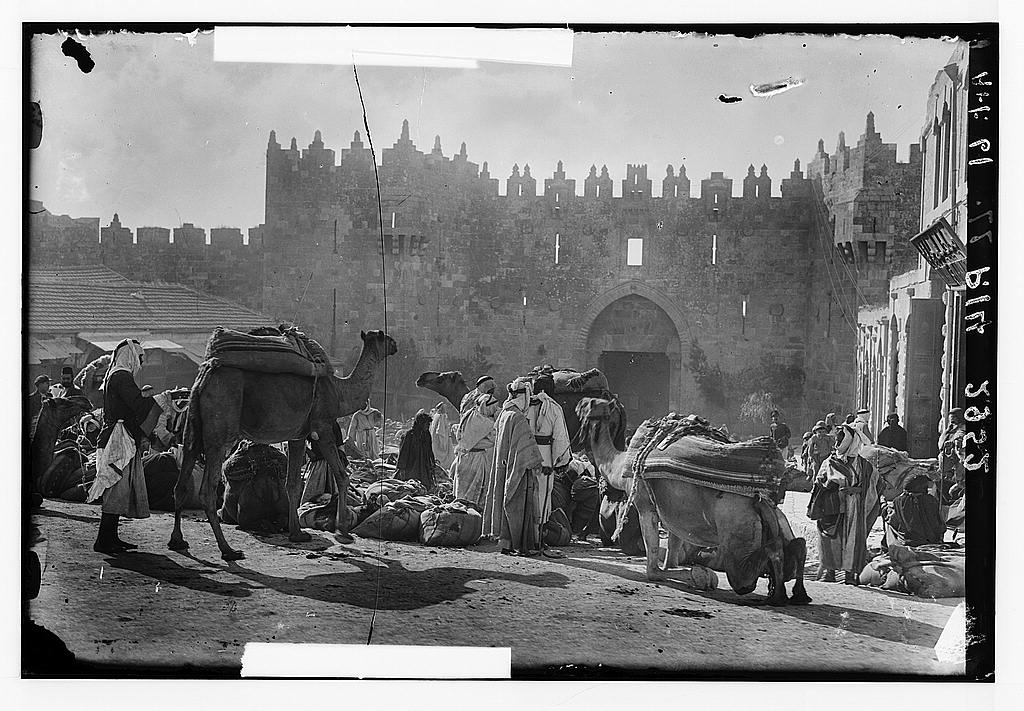
Unloading wheat-laden camels waiting to be unloaded—as in the story below—near Damascus Gate in Jerusalem in the 1920s/1930s. Source: Library of Congress.
This story shows ‘Abdu'l-Bahá giving Shoghi Effendi a major responsibility at a young age, sending him to deal alone with the British army, and it shows Shoghi Effendi, at 21, displaying the leadership and confidence he would lifelong exhibit as Guardian of the Bahá'í Faith.
At some point during Shoghi Effendi's stay in the Holy Land after the end of the war, one of ‘Abdu'l-Bahá's camel caravans carrying sacks of wheat arrived at the gates of Haifa.
The British soldiers guarding the gate of the city refused to allow the caravan to enter. Bahram Furudi and two Bahá'ís, each carrying a sack of wheat, entered Haifa and went straight to ‘Abdu'l-Bahá, and explained the situation to the Master.
‘Abdu'l-Bahá listened very carefully to what Furudi had to say, then sent him with Shoghi Effendi to resolve the situation.
When they arrived at the gate, the commander of the guards, a British Major was relaxing in an armchair, smoking a pipe. In his eloquent and fluent English, Shoghi Effendi explained to the Major that the caravan of wheat was for ‘Abdu'l-Bahá.
According to Furudi, the Major, amazed by such eloquent English from one so young, immediately ordered the soldiers to open the gates for the caravan to enter Haifa.
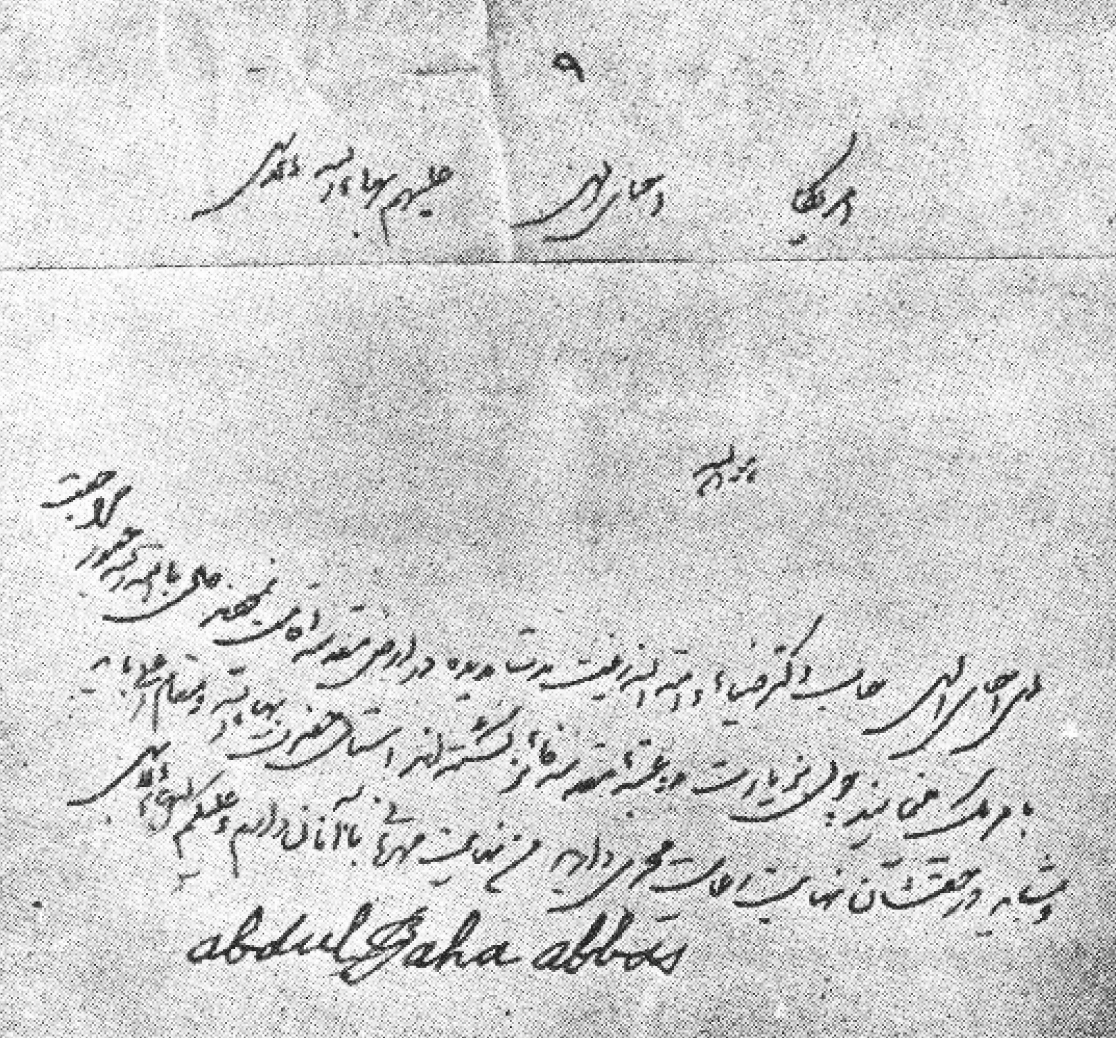
Facsimile of a Tablet revealed and signed by 'Abdu'l-Bahá in His own hand to the Bahá'ís in America, regarding Dr. Zia Baghdádí, his wife and her sister. Source: Star of the West Volume 11, Number 12, page 209.
Shoghi Effendi and ‘Alí Yazdí both graduated from the Syrian Protestant College in the Summer of 1918. ‘Alí Yazdí went to Damascus—his father Ḥájí Muḥammad Yazdí conducted business in both Beirut and Damascus—and Shoghi Effendi immediately returned to Haifa to serve 'Abdu'l-Bahá as His English secretary, during which time he kept diligent diaries and wrote many letters to several friends, including ‘Alí Yazdí.
Shoghi Effendi’s letters and diary entries from this time are a remarkably accurate record of his service to 'Abdu'l-Bahá and his intense feelings of happiness at this precious time in his life. Shoghi Effendi, who had always adored geography, and he was extremely excited to see letters and messages flooding into Haifa from all over the world—from the United States, Germany, and France, from India and Burma—after years of being cut off from all communications during the War.
Early on the morning of 26 December 1918, 'Abdu'l-Bahá summoned Shoghi Effendi to His presence. When Shoghi Effendi arrived, the Master was seated on the sofa, wrapped in His mantle and buried under masses of letters, messages, and telegrams. Shoghi Effendi sat, pen in hand, and took dictation from his Grandfather. One of the Tablets 'Abdu'l-Bahá revealed that morning was addressed to Juliet Thompson. Shoghi Effendi was so thrilled that he described the excitement of the day in a letter he wrote ‘Alí Yazdí on 26 December 1918:
Every day carries with it its fresh tidings and happy news. From the Far-eastern land, the center of news has shifted today to Persia, in the Middle East, and thence to the extreme West in the U.S. of America. Many telegrams have arrived, and each contributed its share of consolation and solace. From the dear land of Persia, the doors of which are still practically closed, in a material sense to the face of the Beloved, this bit of good news is wired: “Good news made all extremely happy; friends well safe and united; desiring only Thy will.” From France a similar cable is at hand expressing joy at the receipt of the Beloved’s cable and conveying love to all. From Boston and Chicago alike the news arrive[s] that the friends rejoice at ‘Abdu’l-Bahá’s deliverance, supplicate Tablets, and even beg the Master to come to their shores.
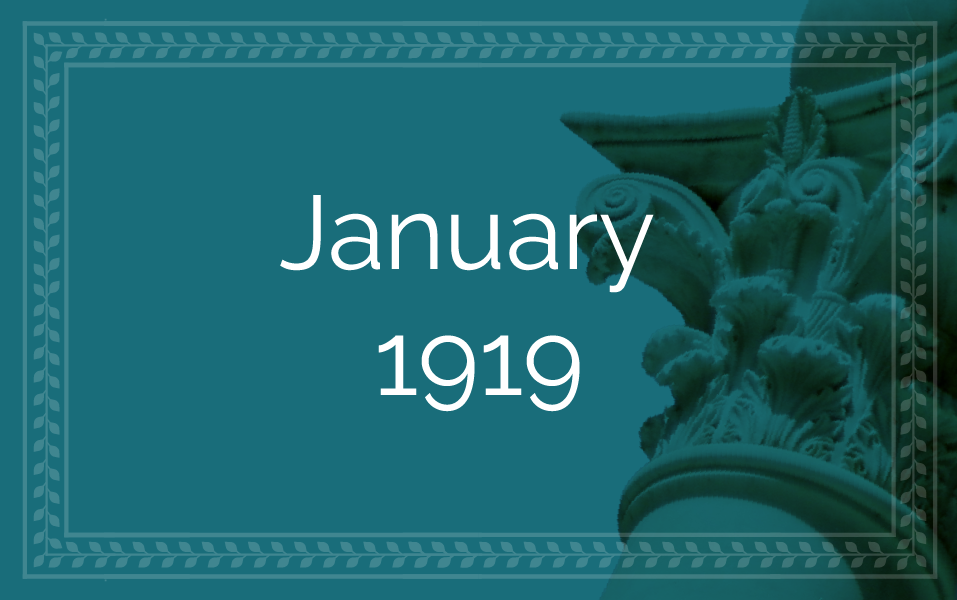
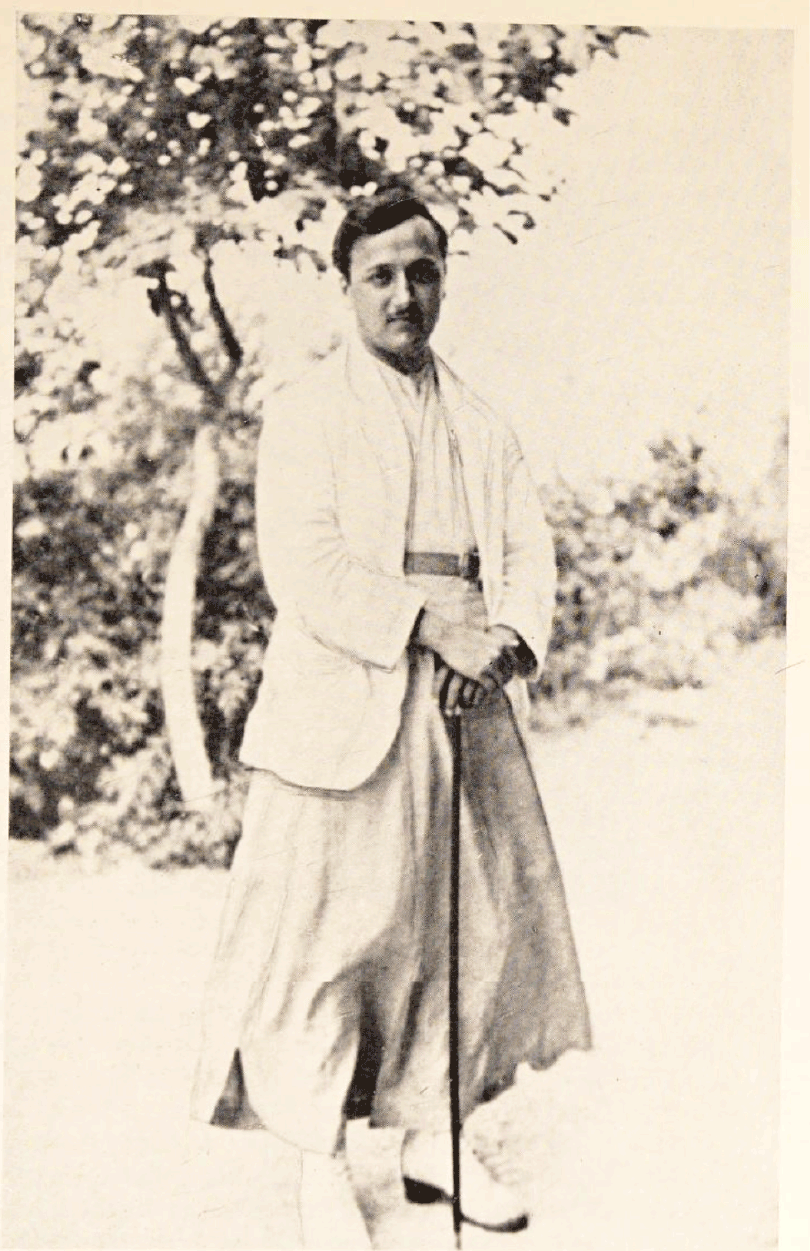
Shoghi Effendi in oriental robes, in the manner he used to dress before he went to study at Oxford. Source: The Priceless Pearl, between pages 88 and 89.
By January 1919, a mere four months after Shoghi Effendi’s arrival, ‘Abdu'l-Bahá had already revealed more than 100 Tablets to the friends in America.
Every single day since the end of World War I in the autumn of 1918, when communications, which had been cut off for years had been reestablished, 'Abdu'l-Bahá’s workload had geometrically increased from day to day as letters, cables, reports, and eventually pilgrims began pouring into Haifa once again.
The deluge of work is clearly reflected in Shoghi Effendi’s letters from this time to various Bahá'í friends:
this interruption of correspondence with you on my part has been solely due to a great pressure of work in connection with the dictation and translation of Tablets…The whole afternoon has been spent in translating for him only the contents of a part of the supplications from London.
Shoghi Effendi concludes this same letter by saying:
I enclose, out of my Bahá'í and particular affection for you, two photographs…My head is in a whirl, so busy and so eventful was the day. No less than a score of callers from prince and pasha to a simple private soldier have sought interview with 'Abdu'l-Bahá. The Beloved from morn till eve, even at midnight is engaged in revealing Tablets, in sending forth his constructive, dynamic thoughts of love and principles to a sad and disillusioned world.
As I am writing these lines, I am again moved to present myself in his presence and take down his words in response to the recently arrived supplications.
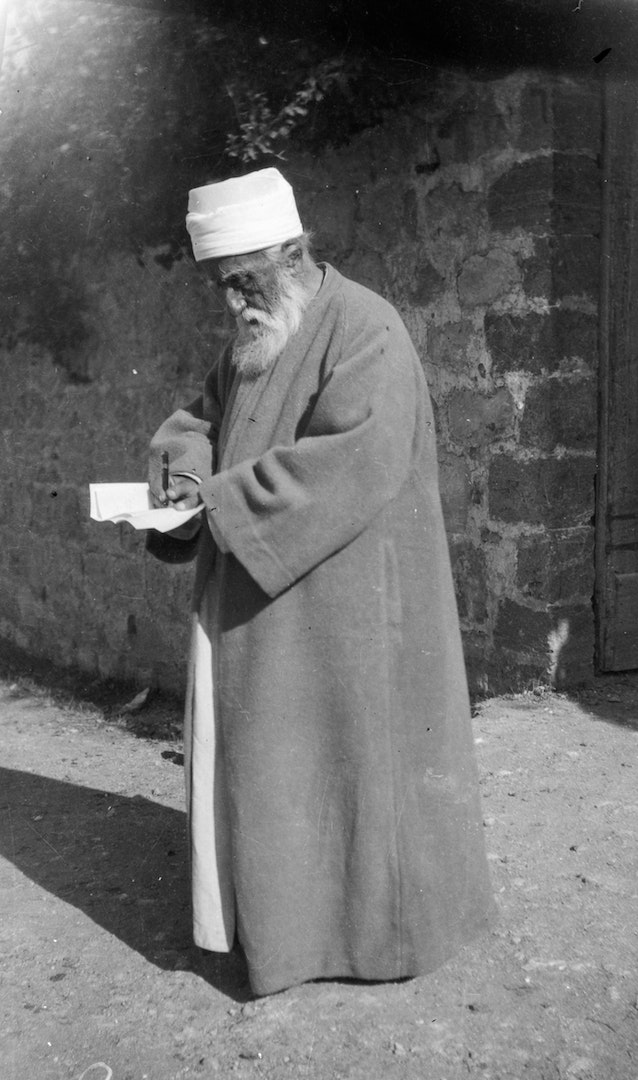
'Abdu'l-Bahá writing in Haifa, around 1920. Source: Bahá'í Media Bank, © Bahá'í International Community 2023.
During his service to 'Abdu'l-Bahá, Shoghi Effendi began frequently accompanying the Master to a steadily increasing number of official functions to which He was invited. These functions included events such as visits to the British Military Governor of Haifa and interviews with the Commander-in-Chief, Sir Edmund Allenby, the General who had led the Allied forces in Palestine. About this visit, Shoghi Effendi wrote:
This was the second time 'Abdu'l-Bahá had called on the General and this time the conversation centered around the Cause and its progress…He is a very gentle, modest and striking figure, warm in affection, yet imposing in his manners.
Lord Allenby would later be largely responsible for 'Abdu'l-Bahá’s being knighted by the British Government in April 1920, after Shoghi Effendi had left the Holy Land. The grandson of 'Abdu'l-Bahá was now becoming known in these official circles
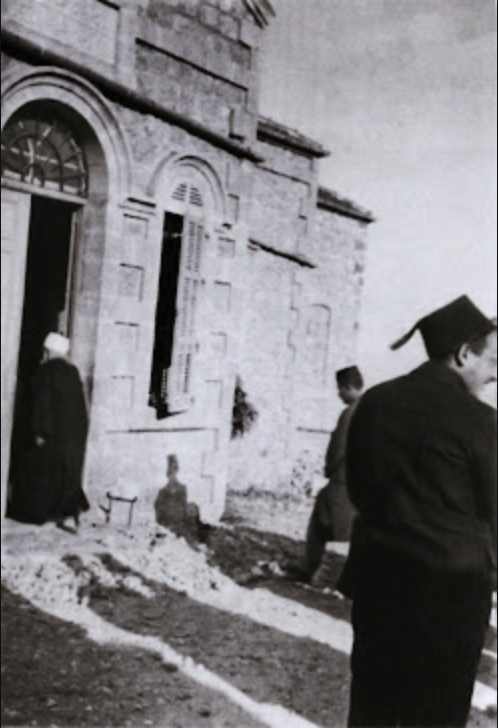
'Abdu'l-Bahá enters the Eastern Pilgrim House, with Shoghi Effendi in the foreground. Source: 'Abdu'l-Bahá in the Holy Land.
During his time in the Holy Land at 'Abdu'l-Bahá’s side, Shoghi Effendi accompanied the Master everywhere, and was His constant companion, no doubt a source of great joy and satisfaction to both Grandfather and grandson.
Like 'Abdu'l-Bahá, Shoghi Effendi began to spend a great deal of time with pilgrims, sometimes with the Master, and sometimes alone, and he eagerly gathered as much information as he could from them about the progress of Bahá'í activities in many countries around the world.
These years were the beginning of the years of prestige in 'Abdu'l-Bahá’s Ministry. With the end of the war, and His heroic efforts during the conflict to save people’s lives by bringing hundreds of camels of wheat and corn to Haifa and 'Akká, as well as His services to the British Army after their liberation of Haifa, 'Abdu'l-Bahá’s star had risen locally, regionally, and internationally.
Shoghi Effendi had a front seat in carefully observing how 'Abdu'l-Bahá dealt with high-ranking officials, local and regional notables, international figures.
But he also watched closely at how 'Abdu'l-Bahá conducted Himself in the ever-present toxic atmosphere created by the envy, jealousy and intrigues of His enemies, both internal and external to the Faith. These precious lessons would be the bedrock of Shoghi Effendi’s 36-year Guardianship.
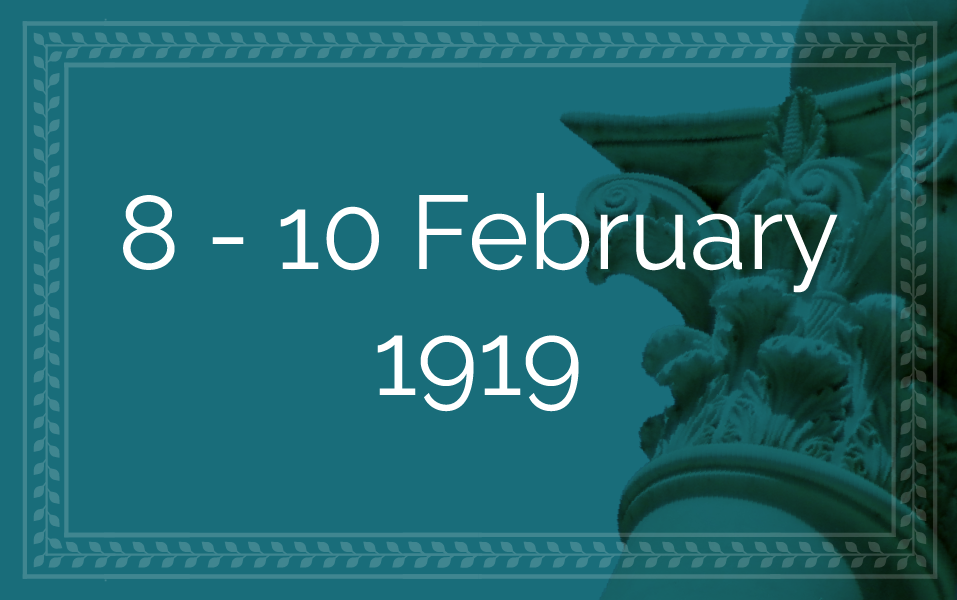
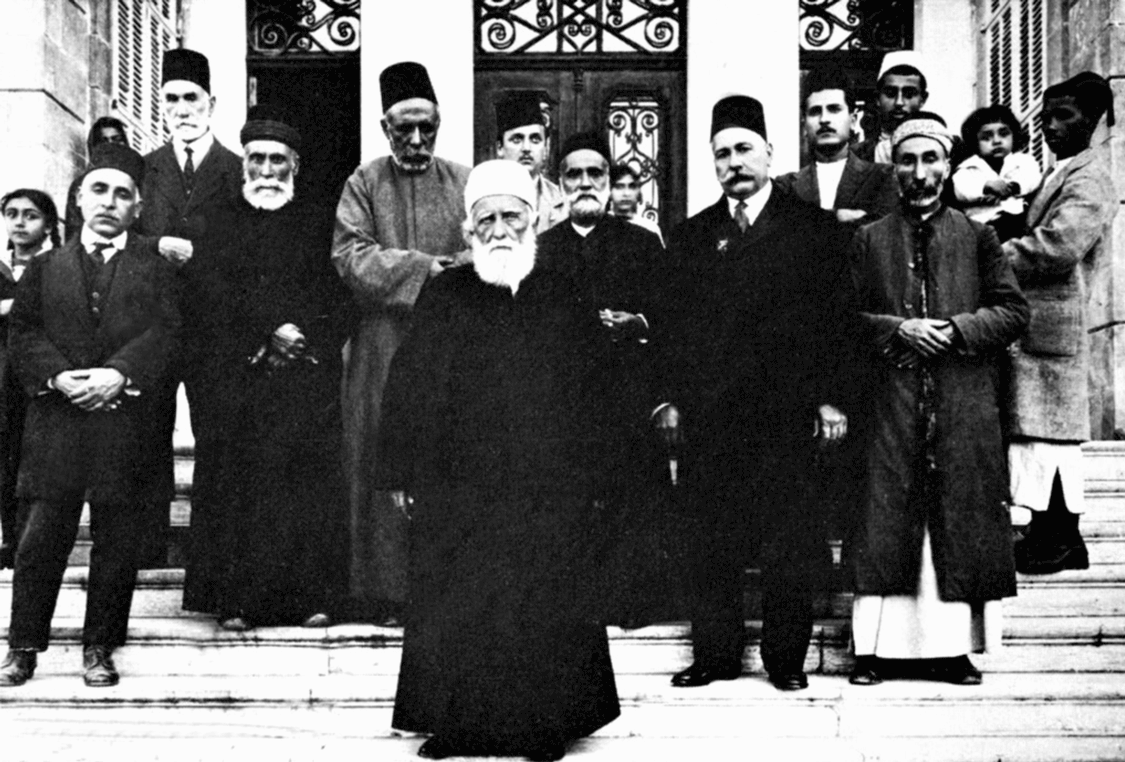
'Abdu'l-Bahá with some pilgrims in February 1919. Shoghi Effendi is standing at the very back in the center of the photo, immediately behind 'Abdu'l-Bahá’s head. Source: 'Abdu'l-Bahá in the Holy Land.
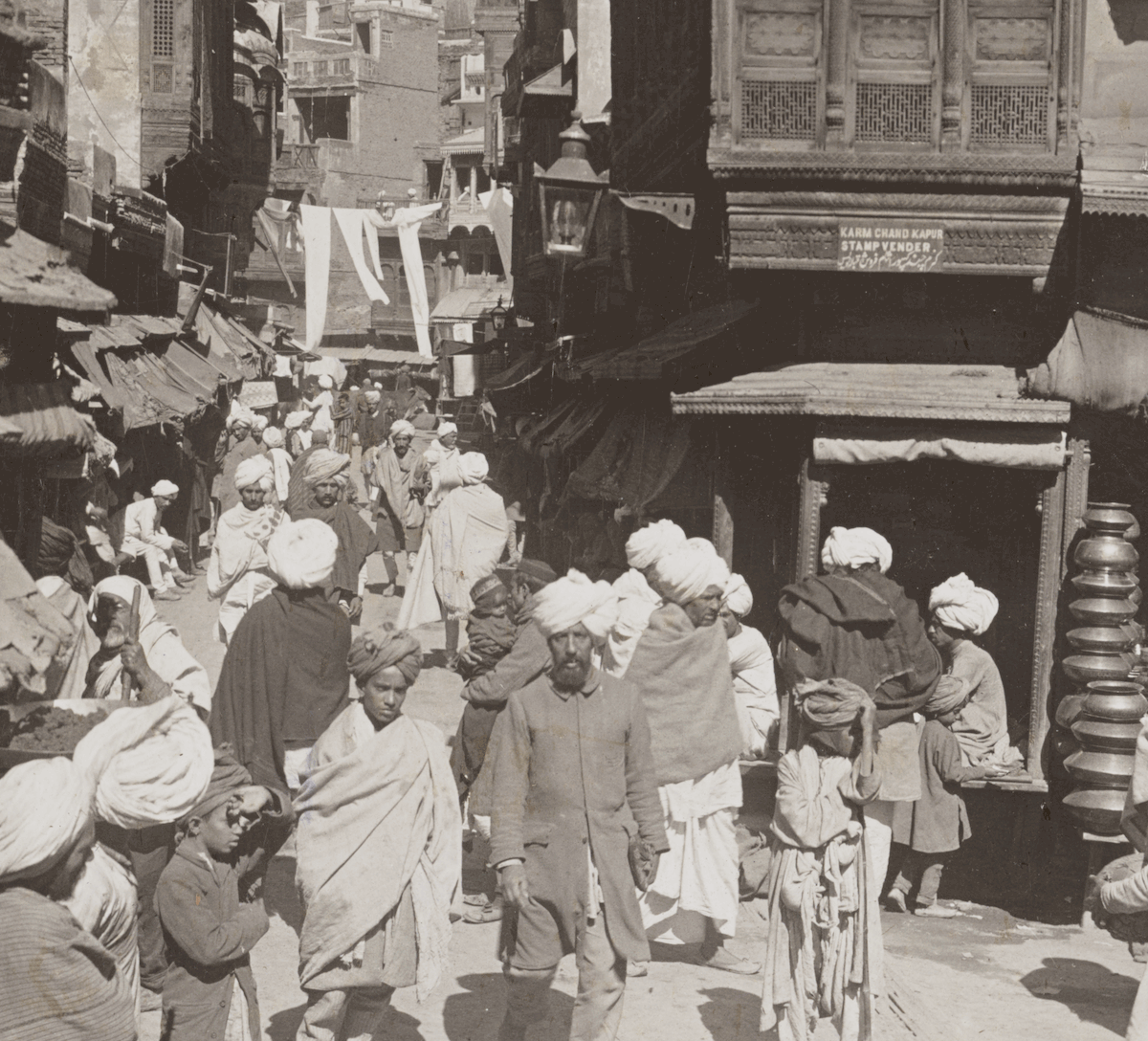
A crowded street of Lahore, Pakistan, where the principal character in the story below is from. Source: Library of Congress.
Beginning with the eighth paragraph, Shoghi Effendi recounts the visit of a man he describes in the next paragraph as a “diligent scholar,” and his description of the visitor is captivating because of the intimacy one can feel in the friendship and admiration of this one individual, meeting 'Abdu'l-Bahá, Center of the Covenant, Perfect Exemplar, and most probably the very reason why Shoghi Effendi describes the visit in such detail:
This afternoon our Indian officer, Captain Agal Khan of Lahore, Punjab, who is a devout Moslem, keenly interested in the role that the Cause will play in the future—a traveler and observer in different regions of the West as well as the Far East, a tourist to Spain and a resident for many years in Peking, Tientsin, Tokyo and Yokohama, a scholar of the religious movements in the East—called on Abdul-Baha carrying with him the article of Abbas Ali of Rangoon, published in one of the local Indian papers of Punjab, which he had translated for Abdul-Baha into English.
The article was a lucid and at the same time a striking account of the teachings of the Cause, of the early life, the declaration, the persecution and the martyrdom of the Bab and the rise of Baha'u'llah; his early trials, his exile, his declaration and his amazing power displayed in the distant fortress of Acca.
Abdul-Baha entertained this diligent scholar for over an hour, told him that under chains and fetters he propagated his teachings, the mutual arrangements of the rulers of Turkey and of Persia to quench his Light and the utter failure of their plans and intentions.
Agal Khan was amazed to know that the remains of the Bab, who was shot in Tabriz, were transferred to this Holy Mount on the slopes of which, and not far distant, his tent was pitched and his camp was established.
Resolutely, he decided to visit the shrine and if possible to visit the Holy Tomb in Acca. When he left he told Abdul-Baha that next time he would bring with him some of his Indian friends and colleagues who expressed their wish to meet the Beloved.
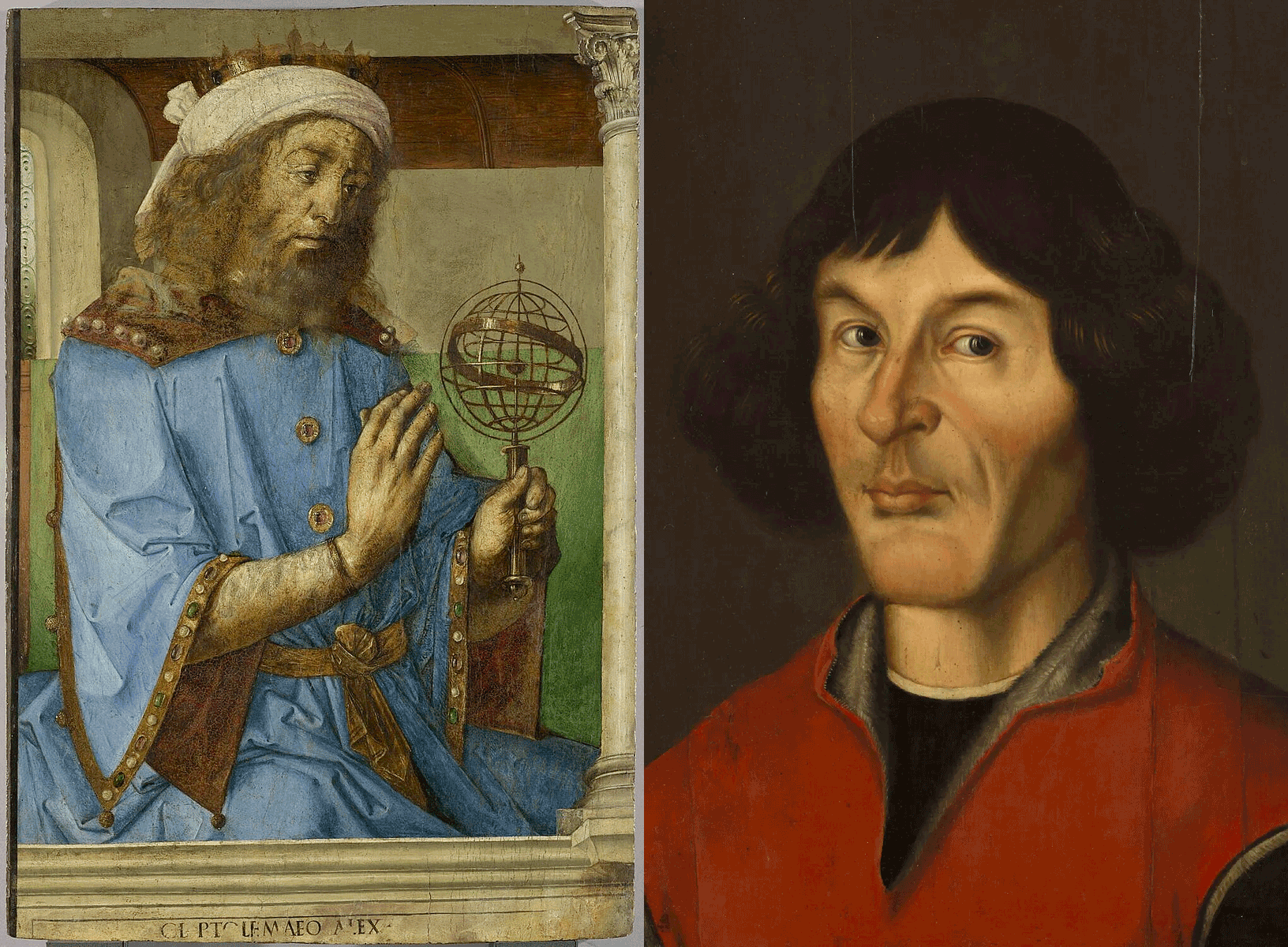
On the left, Ptolemy—An Egyptian mathematician, astronomer, astrologer, geographer, and music theorist, who wrote about a dozen scientific treatises, three of which were of importance to later Byzantine, Islamic, and Western European science (Wikimedia Commons)—and on the right, Copernicus—a Renaissance polymath from Poland active as a mathematician, astronomer, and Catholic canon, who formulated a model of the universe that placed the Sun rather than Earth at its center—(Encyclopaedia Britannica)—just two of the many subjects brilliantly woven together by 'Abdu'l-Bahá in the story below.
Shoghi Effendi’s second diary letter was written the very next day, and was completely different in content. Again, he mentions the name of 'Abdu'l-Bahá’s visitor, Mr. Bahader, a student at Syrian Protestant college, who meets the Master in front of the Shrine of the Báb on a bright and warm Mediterranean afternoon.
The conversation begins informally, 'Abdu'l-Bahá asking Mr. Bahader if the students at SPC are still holding spiritual activities. The young man responds that they never miss a Sunday devotional meeting. The youth says that the president of the college made some sort of remark about his own Sunday morning Bible classes, and Shoghi Effendi relates 'Abdu'l-Bahá’s astounding response.
'Abdu'l-Bahá picks up on the subject of the Bible, which the president of the Syrian Protestant College studies weekly, and then embroiders an absolutely majestic masterclass argument regarding Progressive Revelation, beginning with the Old Testament, then the Gospels, and the Qur’án.
The fact that Shoghi Effendi wrote the entire process of 'Abdu'l-Bahá’s logical thinking and argumentation is important in and of itself. But there is more to this story, because, as the Guardian, Shoghi Effendi will himself construct unassailable arguments of this type, and it is so clear here, that he was inspired and guided in this direction by the example of the Perfect Exemplar.
As an homage to this link between Grandfather and grandson, between Center of the Covenant of Bahá'u'lláh and Guardian of the Faith of Bahá'u'lláh, here is the entire retelling of 'Abdu'l-Bahá’s discourse on progressive Revelation, in front of the Shrine of the Báb, on a warm Saturday in February in Haifa.
Listen closely and hear the marvel and astonishment, the pride and joy in Shoghi Effendi’s voice when he lays out the beauty, the logic, and the scientific rigor of 'Abdu'l-Bahá’s speech:
This afternoon being bright and warm, Abdul-Baha ascended the mountain and visited the Tomb of the Báb where the friends had assembled for their weekly Sunday gatherings, where he inquired regarding the spiritual activities of the S. P. C. students (Beirut) to which one of its members, Mr. Bahader, who is still here for a short visit to Abdul-Baha, replied that their weekly Sunday gatherings are uninterruptedly held within the college grounds. This leading to a certain statement made by the president of the college with respect to his Sunday morning Bible classes, Abdul-Baha referred to the relative standing of the Holy Books and their adaptation to their respective environment.
The Old Testament, he said, is largely historical and partly states various commands and regulations. The Gospel, on the other hand, in addition to these two subjects, reveals a whole set of admonition and exhortation, of counsels and of advice. The Qur’án embodies all three of these and in addition reveals abstruse, scientific and mathematical problems.
He then spoke in detail of the variety of the branches in mathematics and astronomy as expounded by the Egyptian, Babylonian, Greek, Roman and Persian leaders and scientists.
He then referred to the rise of Ptolemy, his compilation of the different theories of past mathematicians, his school in Alexandria, his book being the essence and gist of previous laws and theories and his founding the well-known Ptolemaic system.
He told us how all astronomers and philosophers believed in his system and although Pythagoras and Plato revealed contradictory facts, that the Ptolemaic system was considered the immutable and correct law.
Then arose that illiterate, young, inexperienced Arab leader in the Arabian peninsula, who revealed his Qur’án wherein the following words are incorporated: “The sun moves in a fixed place and each star moves in its own heaven.” These boldly challenged the whole Ptolemaic system and shook it down to its very foundation.
However, it was not until the 15th century, when the famous Copernicus discarded the baseless interpretation of the ‘ulamá in their explanation of the two above-mentioned verses, overthrew the Ptolemaic system and asserted the truth of the statement of the illiterate Arab youth, who declared the movement of the earth and the immobility of the sun. The whole scientific world arose to the consciousness of this truth.
What clearer and stronger proof may be stated for the establishment of the truth of the Mohammedan Revelation? The Qur’án itself abounds with similar conclusive evidences.
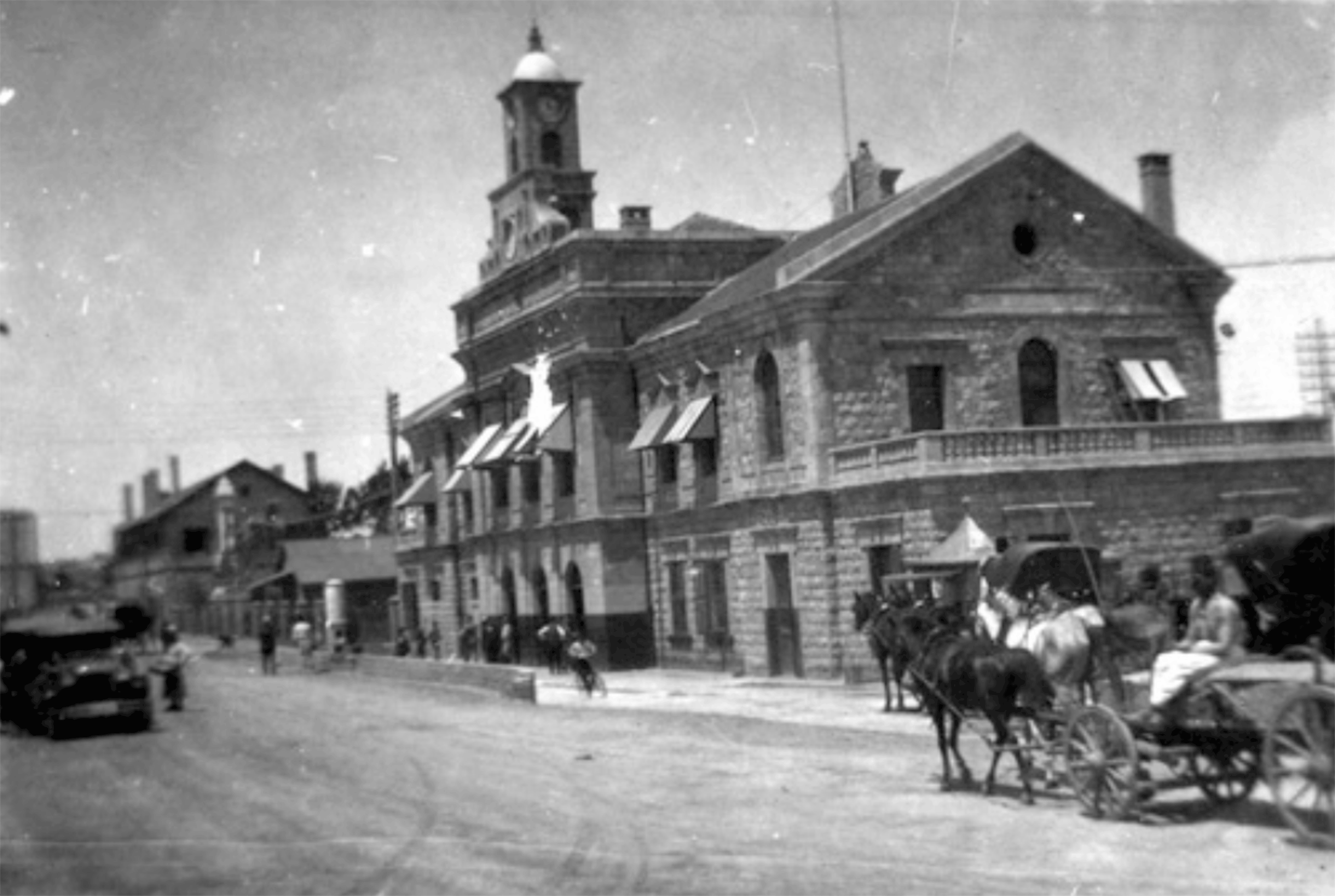
A street scene in Haifa in 1925 in the neighbourhood of the train station. Source: Wikimedia Commons.
‘Abdu'l-Bahá consistently supported charities, wherever He was, gave generous donations to them, and always encouraged Bahá'ís to do the same. In the aftermath of the ravages caused by the famine and the war, the military administration started the Haifa Relief Fund to alleviate the suffering of the Haifa population.
‘Abdu'l-Bahá first contributed 50 Egyptian pounds (equivalent to about $3,550 today, as 50 Egyptian pounds equated £48,75 in 1919, adjusted for inflation), a substantial sum of money in 1918. After the first contribution, ‘Abdu'l-Bahá's name was placed first on the list of contributors.
‘Abdu'l-Bahá then had another 50 Egyptian pounds contributed by Shoghi Effendi in person, and received a letter from the Military Governor, G.A. Stanton, dated February 10, 1919 which spoke for itself:
Your Eminence:
I have today received from your grandson [Shoghi Effendi] the sum of £50 as a further donation from yourself to the Haifa Relief Fund. Please accept on behalf of the committee of management, my very sincerest and most grateful thanks for this further proof of your well-known generosity and care of the poor, who will forever bless you for your liberality on their behalf. Please accept the sincerest assurance of my deepest regards and respect.
(Signed) G. A. Stanton, Colonel, Military Governor.
It is interesting to note that by giving a very generous donation in the name of Shoghi Effendi, 'Abdu'l-Bahá is connecting the soon-to-be Guardian of the Faith with the highest levels of administration in the embryonic Bahá'í World Center in Haifa.
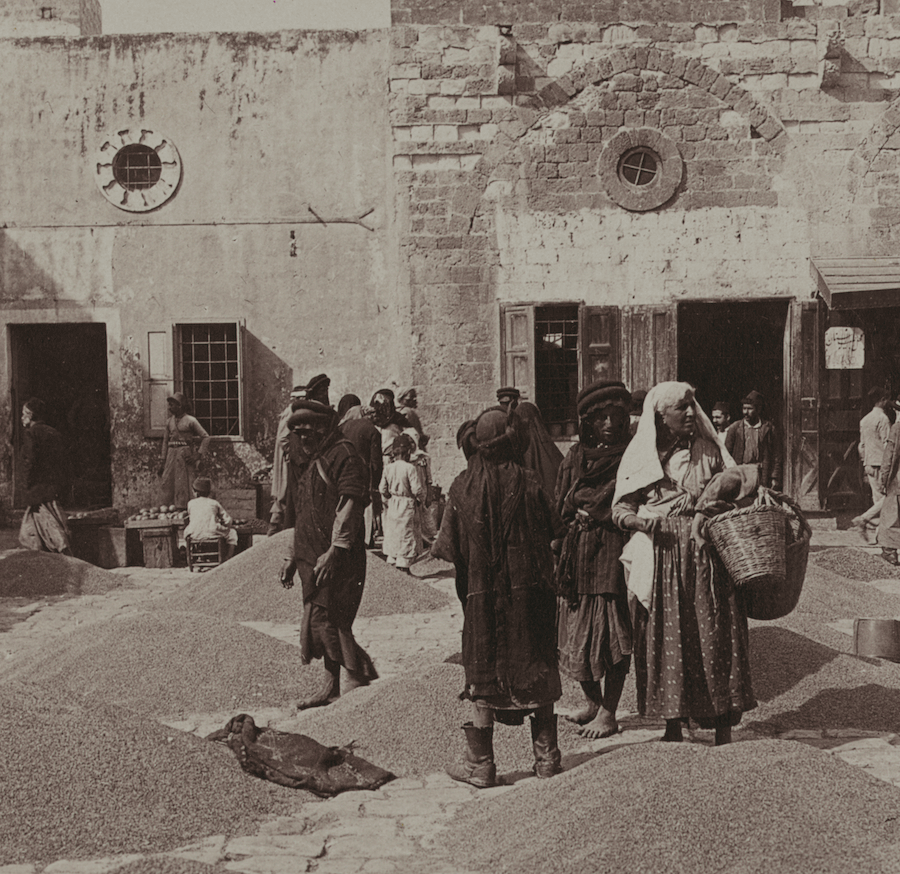
The Haifa grain market around 1904, in peace time and 15 years before hunger assailed the city after World War I. Source: Library of Congress.
Shoghi Effendi’s third published letter in Star of the West was written one day after the one recounting 'Abdu'l-Bahá’s discussion of progressive Revelation, and it was written on the same day as Shoghi Effendi contributed £50 to the Haifa Relief Fund, and so it should come as no surprise that this is the main subject of this letter.
So far, the three letters on three consecutive days are wildly different in content, and this is the reason these letters are addressed in such length.
Observe the variety of interactions that Shoghi Effendi witnessed in serving 'Abdu'l-Bahá so closely. Revel in the rich tapestry of the Master and Shoghi Effendi’s lives of service at the nascent Bahá'í World Centre. Admire the different facets of the Master that shine in each of these letters. Marvel at the training Shoghi Effendi was receiving, barely three years before the mantle of the Covenant came to rest, oh so heavily on his shoulders.
Speaking about the importance of the Haifa Relief Fund, Shoghi Effendi writes:
The misery and need of the civil population of Haifa, at the time of British and allied occupation, has necessitated the formation of a Haifa Relief Fund composed of the heads of the different religious denominations and acting under the surveillance of the British authorities with a fund collected and deposited at the newly established branch of the Anglo-Egyptian Bank.
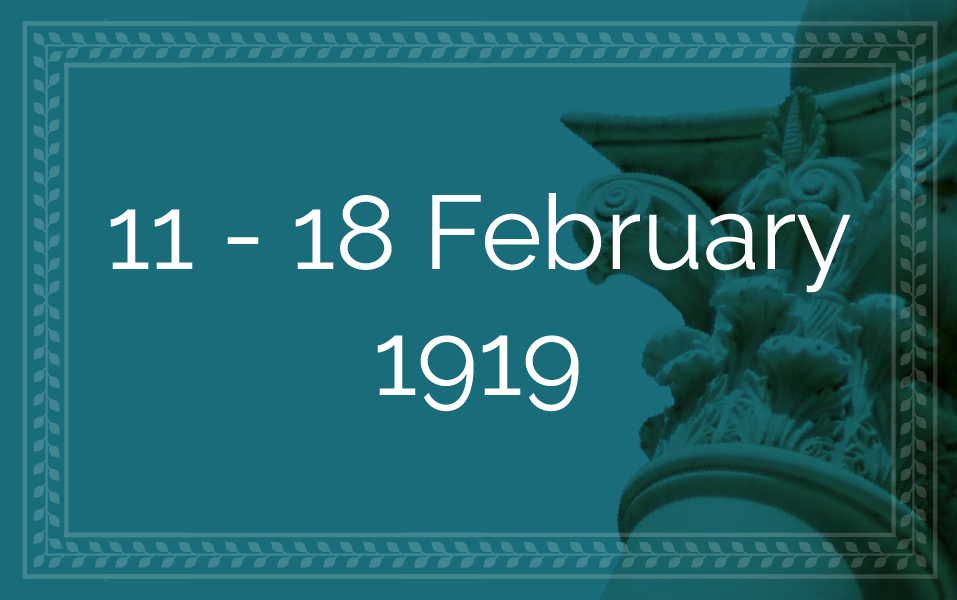
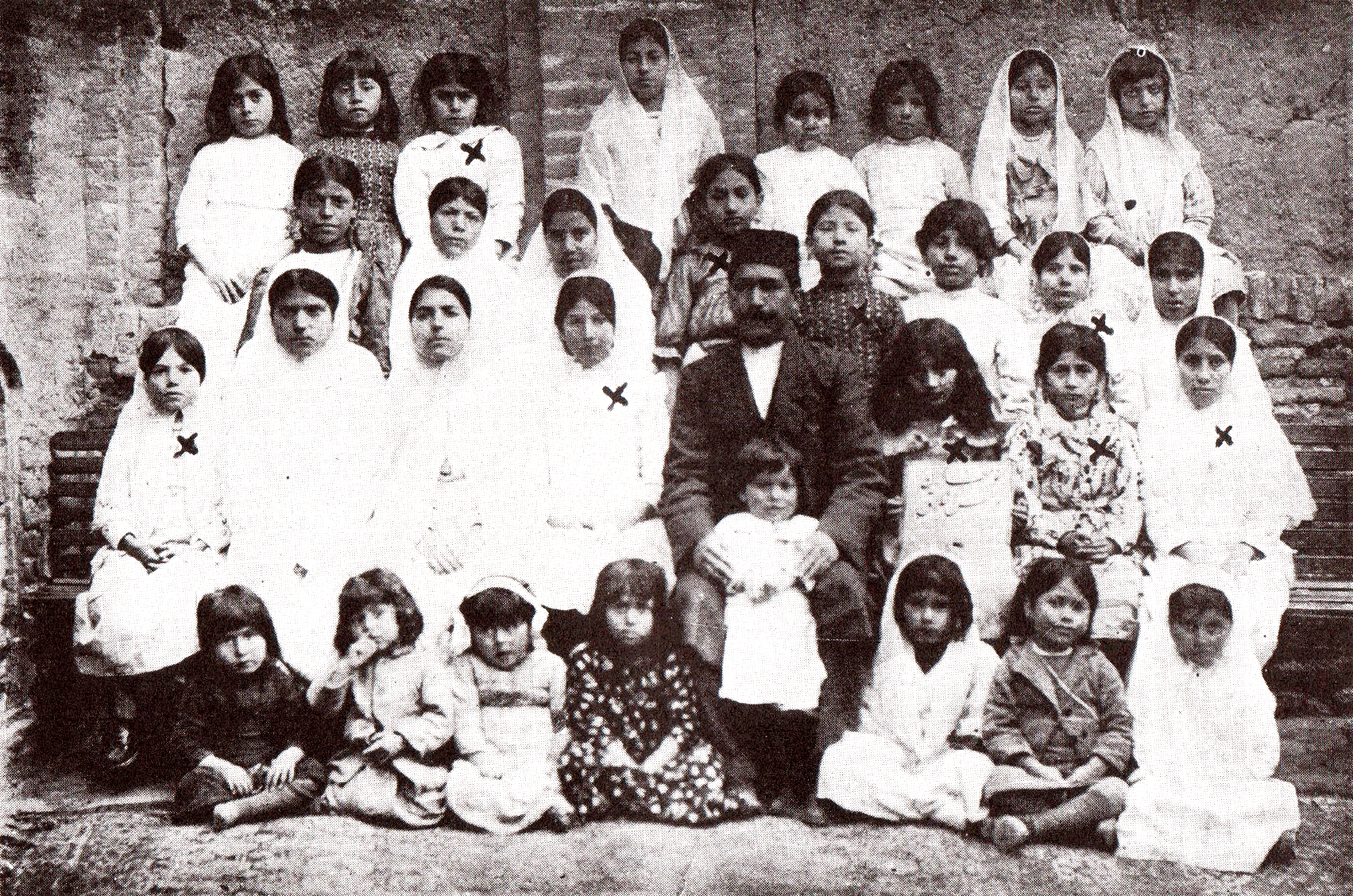
After Persia was able to send out mail again, following World War I, these were the types of news items that began being published in Bahá'í journals and magazines. This is Muḥammad Labíb’s Bahá'í class for girls in Qazvín, Persia, sent to Star of the West by Dr. John E. Esslemont. The students marked with an X on their shoulder were also Dr. Labíb’s Esperanto students. News such as this from Persia must have greatly cheered the hearts of 'Abdu'l-Bahá and Shoghi Effendi. Source: Star of the West Volume 11, Number 18, page 298.
On 11 February 1919, Shoghi Effendi wrote the fourth diary letter that would be published, along with the first three in the very same issue of Star of the West: Volume 10, Issue 11, published on 27 September 1919.
We learn that 'Abdu'l-Bahá spent the whole day indoors, and for good reason. 11 February 1919 was an important date. It was the day when 'Abdu'l-Bahá received the very first batch of letters from Persia and India since the outbreak of World War I. Nearly five long years without any news from the Bahá'ís in the far East and in the cradle of the Faith. The letters were filled with heartbreak and Shoghi Effendi describes the sufferings of the Persian friends and sad state of Persia itself:
Their meetings, notwithstanding famine, pestilence, rapine, internal war and isolation from the Holy Land, have been regularly conducted and elaborately organized…Factions and parties have failed in their aims and have met disappointment in the realization of their aspirations. The Nationalists, the Reactionaries, the Liberals and the Democrats have left Persia a desolate country…
Shoghi Effendi shares with the Bahá'í friends in the West the appointment of ‘Alí Quli Khán as a delegate to the Peace Conference at Versailles in the next few months, and the perspective he offers when presenting this fact is stunning, and reminiscent of Shoghi Effendi’s future statements in God Passes by, when he recontextualizes history within the framework of Bahá'í history:
…a government that has persecuted, tortured, exiled, burned and devastated the homes of those who were related to this Cause, has now placed its full confidence and has elected a Bahai to be its representative at the great International Congress sitting at Paris.
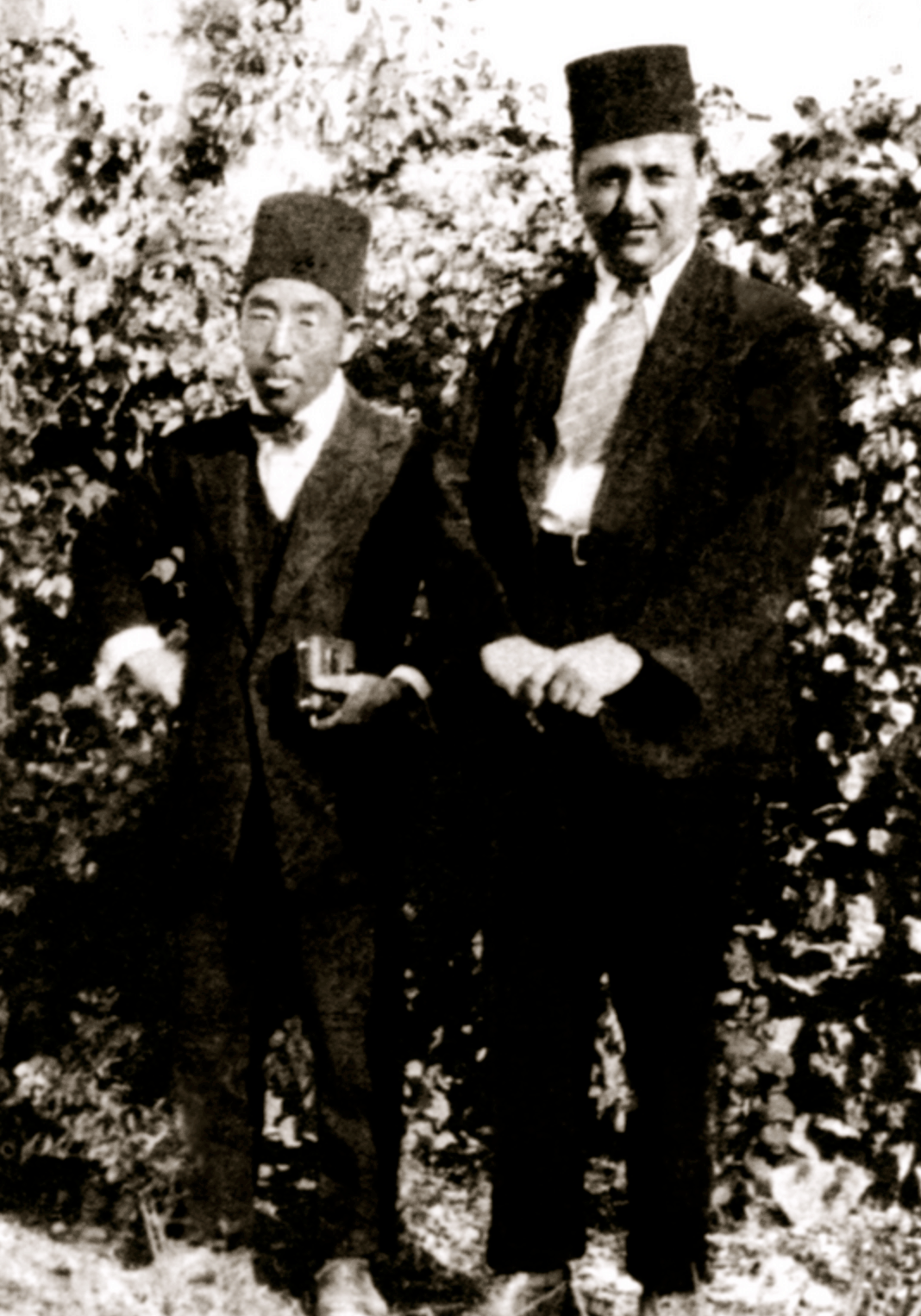
Shoghi Effendi standing with Saichiro Fujita in 1919. Saichiro Fujita had come to Haifa at the Master's invitation for service, and would remain, on and off, serving first 'Abdu'l-Bahá, then Shoghi Effendi and finally the Ministry of the Custodians and the Universal House of Justice until his death in Haifa in 1976. Source: Bahaimedia.
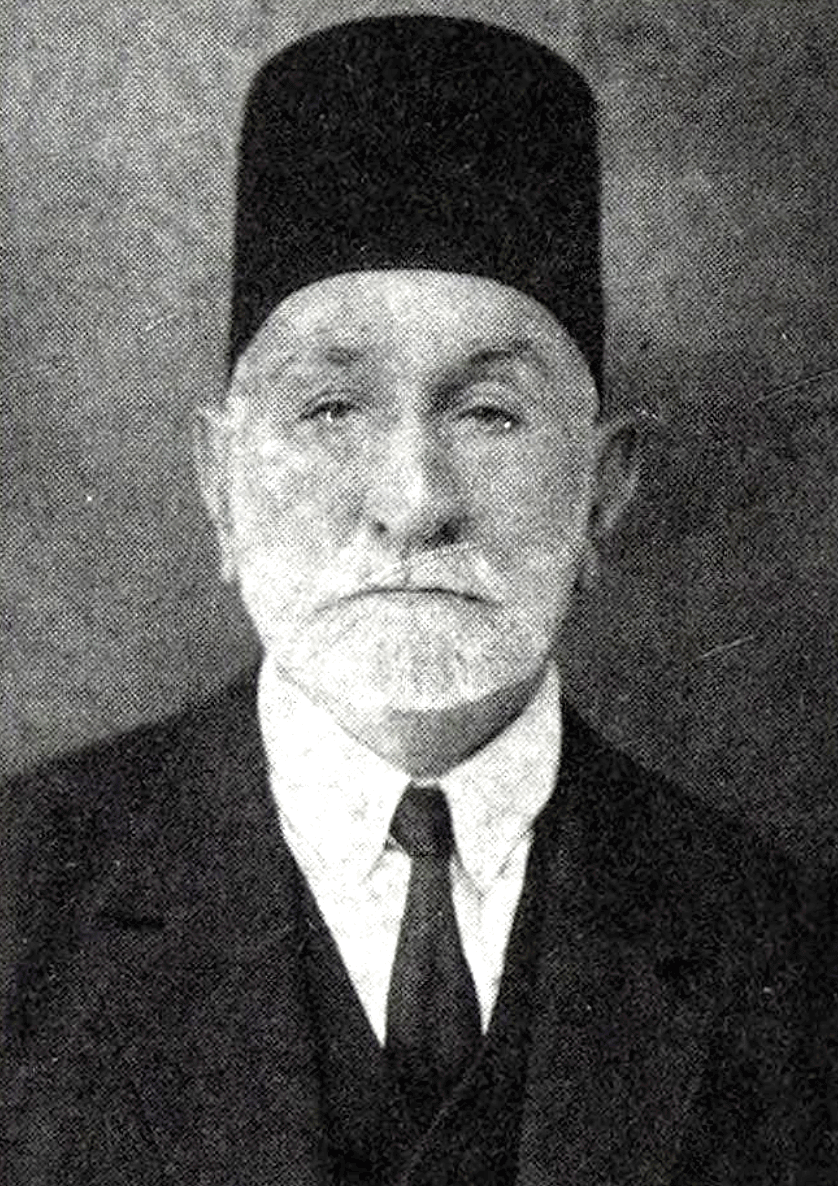
Ḥájí Muḥammad Yazdí, the father of ‘Alí Yazdí, on pilgrimage in Haifa in the story told below. Source: Blessings Beyond Measure, ‘Alí Yazdím page 9.
Ḥájí Muḥammad Yazdí—‘Alí Yazdí’s father—received permission to come on pilgrimage to Haifa and arrived on 13 February 1919, entered into the presence of 'Abdu'l-Bahá, held the hem of His robe in his hand and reverently kissed it.
Ḥájí Muḥammad Yazdí was bringing refreshing and significant news from Damascus: a supplication from an erudite and very influential Muslim Saudi—a native of Medina—who had become deeply attracted to the Faith.
'Abdu'l-Bahá greeted the news with a smile and a nod of appreciation and gave Ḥájí Muḥammad Yazdí a wise recommendation for teaching the Faith in Damascus:
Deliver the Divine message with prudence and wisdom.
'Abdu'l-Bahá rose, reiterated a warm welcome to Ḥájí Muḥammad Yazdí, and left the Bahá'ís together.
At dinner with 'Abdu'l-Bahá, on 15 February 1919, the Yazdí family dominated: Ḥájí Muḥammad Yazdí, of course, having arrived two days before, and his two brothers, Aḥmad Yazdí and Mírzá Ḥusayn Yazdí, Áqá Muḥammad Taqí Iṣfahání, a Persian Bahá'í and pillar of the Egyptian Bahá'í community, three Bahá'ís farmers from 'Abdu'l-Bahá’s village of ‘Adasiyyíh, Badí’ Effendi, and Shoghi Effendi’s father, Mírzá Hádí Afnán, Shoghi Effendi’s father.
'Abdu'l-Bahá was very tired that evening, and did not participate in the conversation for very long. Major Tudor Pole, 'Abdu'l-Bahá’s devoted English admirer, was being delayed in Cairo by a slight illness, and he was due to arrive soon.
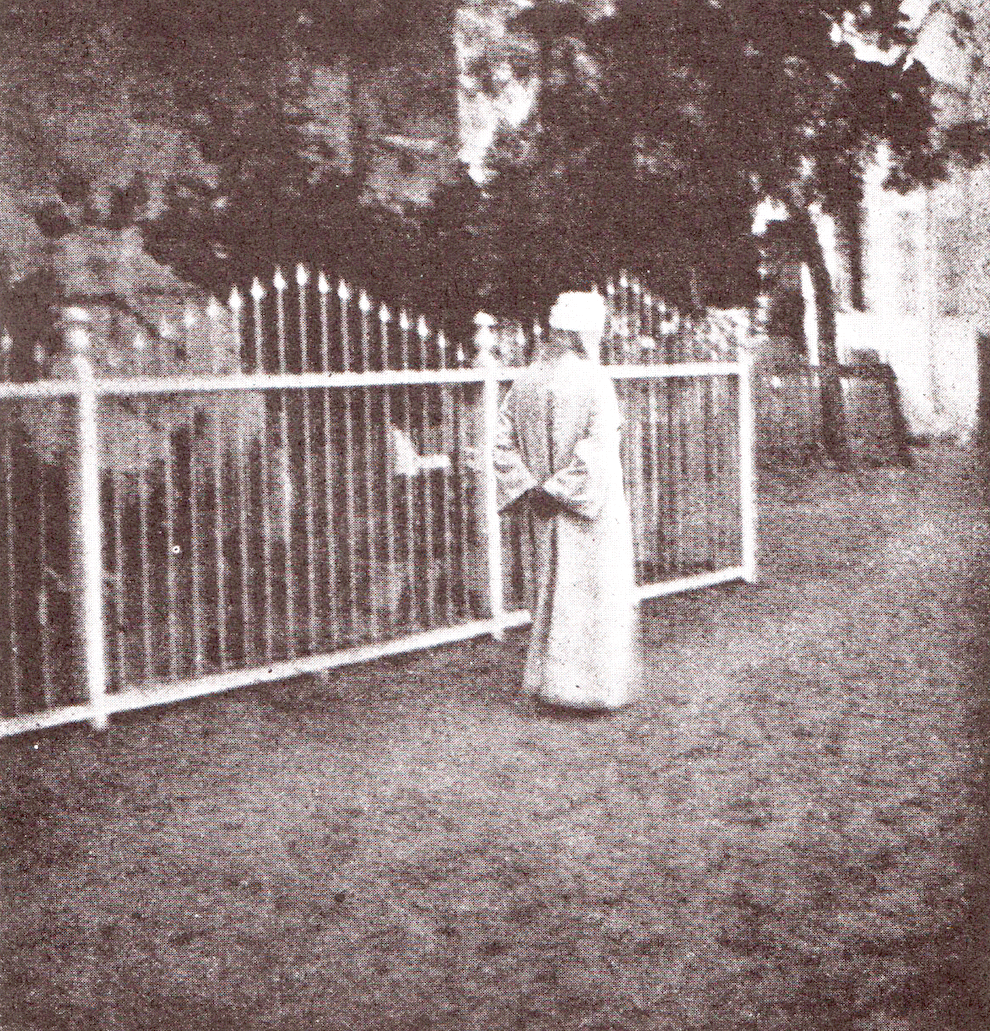
'Abdu'l-Bahá pacing near the Shrine of Bahá'u'lláh. Photograph taken in the middle of the summer of 1919 and sent to Star of the West by Shoghi Effendi. Source: Star of the West Volume 10, Number 10, page 194.
Like his Great-Grandfather, Bahá'u'lláh and his Grandfather, 'Abdu'l-Bahá, Shoghi Effendi had an immense love and profound attachment to the exquisite beauties of nature.
He had many occasions to visit Bahjí with 'Abdu'l-Bahá, and on one such occasion, Shoghi Effendi describes, in a letter to a friend dated 18 February 1919, the stark contrast between the air in Haifa and Bahjí:
Greetings with sweetest remembrances to you, my far-off friend, from this hallowed spot!...The air over there was filled with gases and vapors which steam and motor engines continuously discharge, while the atmosphere here is as pure, as clear and as fragrant as it can be.
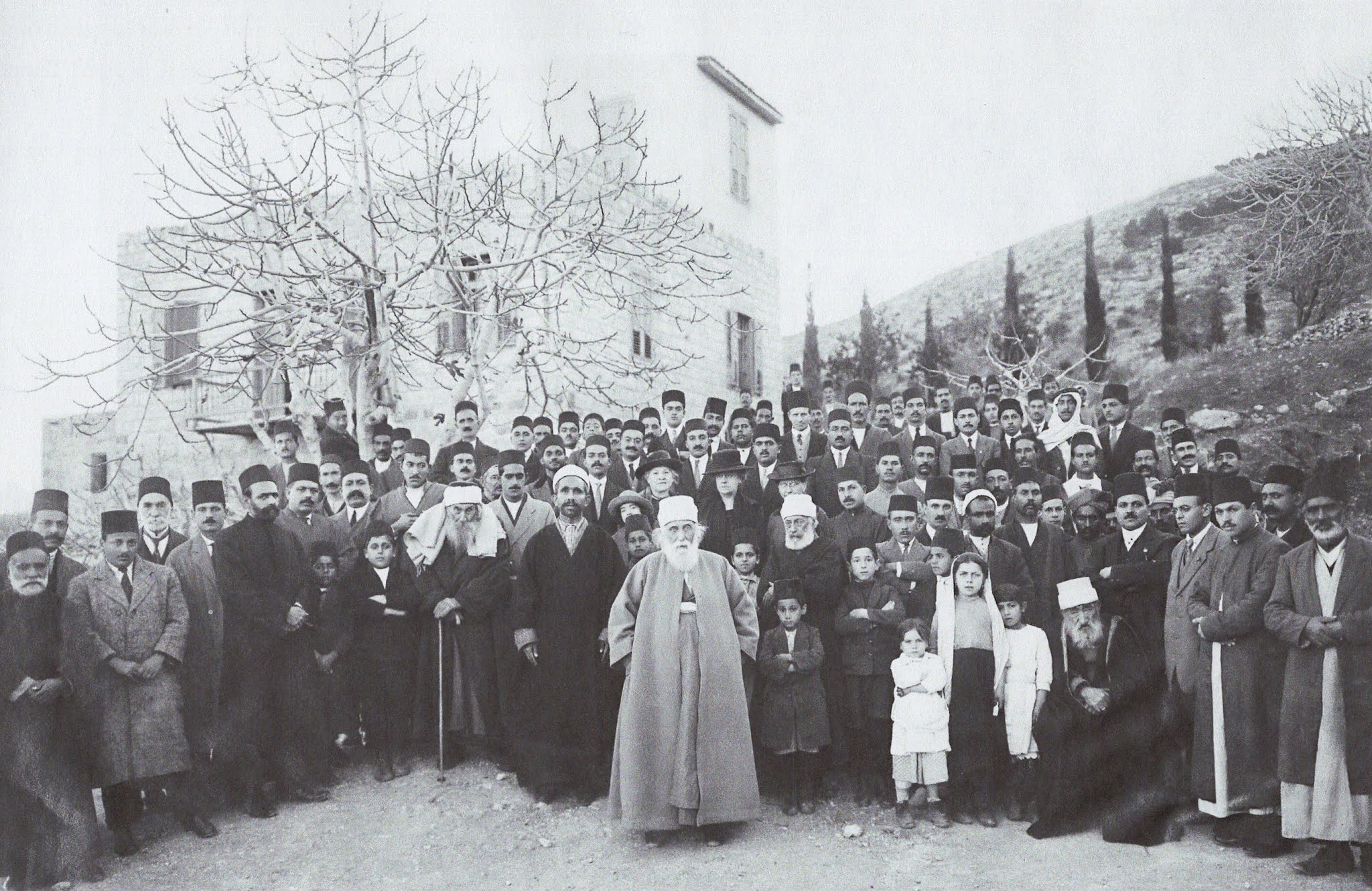
'Abdu'l-Bahá with eastern and western pilgrims in Haifa. Shoghi Effendi is standing third from the left, in a large, buttoned-up grey overcoat, with hands folded over his chest. Source: 'Abdu'l-Bahá in the Holy Land.
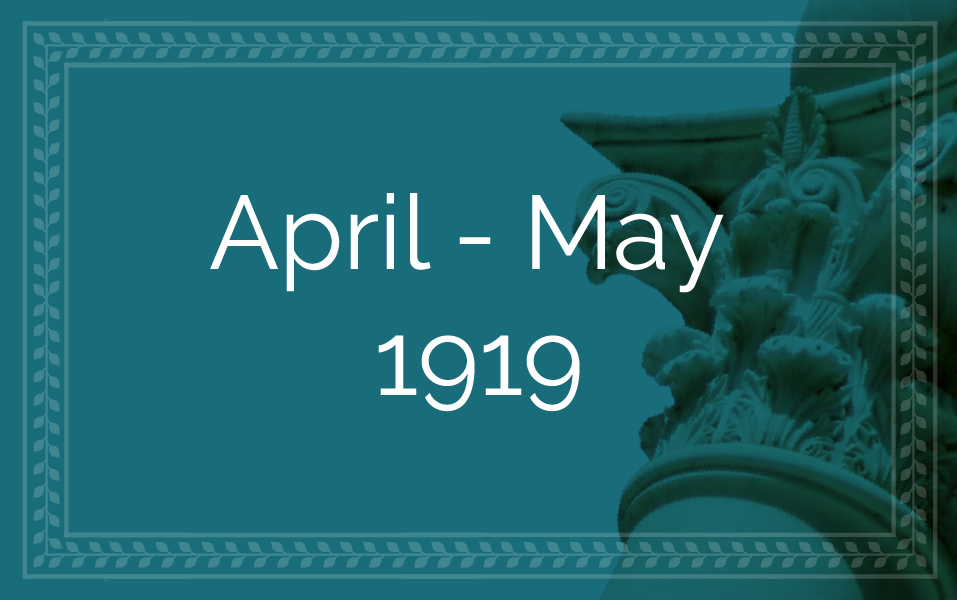
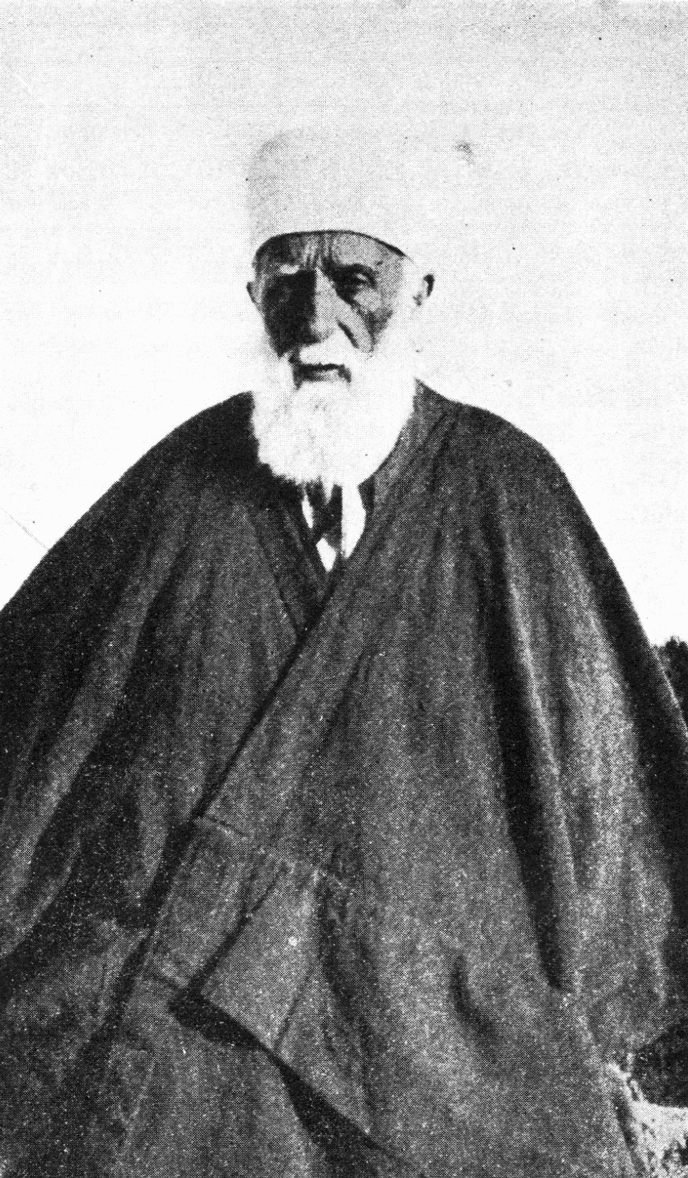
It was inevitable that pursuing his bachelor’s degree while World War I was raging through Europe and the Middle East would leave traces on Shoghi Effendi’s deeply sensitive and tender soul.
In a letter which he wrote in April 1919, Shoghi Effendi describes the years of dire starvation and privations, which millions of people suffered, including 'Abdu'l-Bahá and his own family:
[the] long and dismal years of war, bloodshed, famine, and pestilence, when the Holy Land was isolated from the different regions of the world and was undergoing the utmost and severest degree of repression, tyranny and devastation.
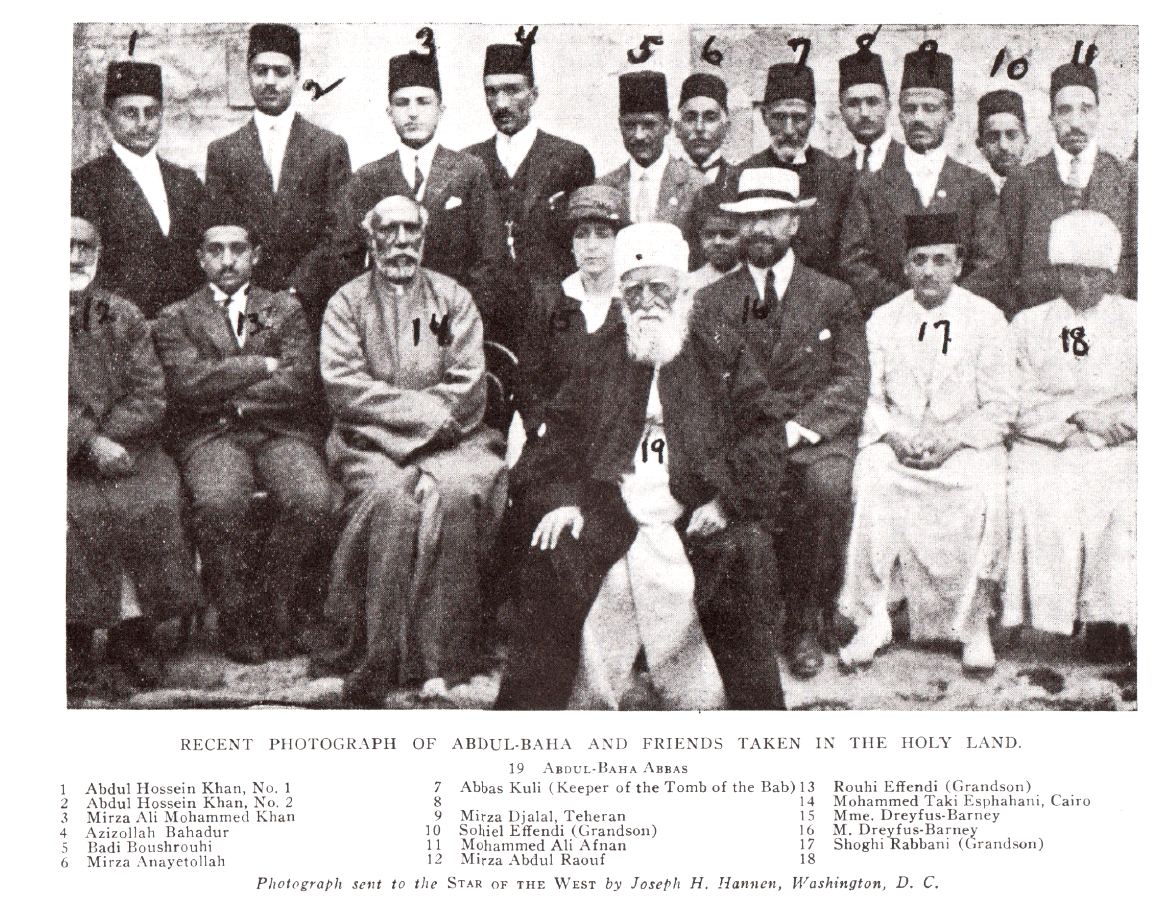
'Abdu'l-Bahá, Shoghi Effendi and 16 Bahá'ís, published in Star of the West Volume 10 Number 5, under the title “Recent photograph of 'Abdu'l-Bahá and friends” on page 82. The 16 friends, numbered on the photograph are listed on the photograph. 'Abdu'l-Bahá is in the center, directly behind him are Laura and Hippolyte Dreyfus-Barney—Hippolyte was the first French Bahá'í and Laura wrote Some Answered Questions. Next to Hippolyte is Shoghi Effendi, dressed in white. Number 7 is ‘Abbás Qulí, the loyal and devoted Custodian of the Shrine of the Báb.
In a long letter to Dr. Baghdadi dated 25 April 1919, Shoghi Effendi shares the news of many pilgrims having arrived in Haifa from France, England, Egypt, and Turkey, including Laura and Hippolyte Dreyfus-Barney.
Shoghi Effendi gives a panorama of the volume of letters that 'Abdu'l-Bahá receives from every corner of the globe: the United States, the Middle East, Persia, Turkmenistan, Japan, Hawaii, New Zealand, and Australia.
The most fascinating aspect of this letter is the great detail Shoghi Effendi goes into while describing the situation of the Bahá'ís in Persia and the condition of the country. Of greatest interest is the first paragraph, a single sentence, something that would, in years to come, be one of the Guardian’s single greatest trademark writing style:
In Persia and particularly in Teheran, the Cause is advancing by leaps and bounds, the number of the friends is prodigiously multiplying, their gatherings and assemblies are open to the public, an intense and widespread interest is being aroused, many an important, responsible position is taken up by wise and firm Bahais, Bahai literature is being printed, published and widely circulated, the seed of knowledge and of faith is being sown broadcast by intelligent and well-directed hands and the influence of the friends of God is being felt everywhere.
Throughout this period of ceaseless activity of reconstruction and of service—at a time when the whole world was in confusion and commotion and when human blood was being so profusely spilt; the friends in Persia were wonderfully protected and saved.
Civil war, pestilence and famine ravaged and devastated Persia and although the death rate on one day had reached the unprecedented number of 1172, the friends of God were miraculously preserved, not a single one fell victim of this great calamity.

Delegates and participants at the 1919 Bahá'í Congress. Source: Brent Poirier's blog on the Tablets of the Divine Plan.
In the Springs of 1916 and 1917, 'Abdu'l-Bahá revealed 8 and 6 extraordinary, visionary, far-reaching teaching Tablets respectively, addressed to the Bahá'ís of the United States and Canada.
'Abdu'l-Bahá revealed 14 Tablets in all, some containing famous teaching prayers, and two Tablets were addressed to each of the following 5 regions—with 4 Tablets addressed to the United States and Canada:
- The Bahá'ís of the Northeastern states (of the United States)
- The Bahá'ís of the Central states (of the United States)
- The Bahá'ís of the Southern states (of the United States)
- The Bahá'ís of the Western states (of the United States)
- The Bahá'ís of Canada and Greenland
- Four Tablets addressed to the Bahá'ís of the United States and Canada
These were the Tablets of the Divine Plan, and formed the first systematic Teaching Plan in the Bahá'í Dispensation. All of the Plans formulated by the Guardian, the Ministry of the Custodians and the Universal House of Justice would only aim to bring 'Abdu'l-Bahá’s Divine Plan to fruition, as will the next hundreds of Bahá'í Teaching Plans.
'Abdu'l-Bahá was able to send the first five Tablets of the Divine Plan on postcards in 1916 before mail was interrupted for the remainder of the war. After the end of World War I, ‘Abdu'l-Bahá removed the nine remaining Tablets from the secure vault in the Shrine of the Báb where they had been safeguarded during the war and had Mírzá Aḥmad hand-deliver them to the Bahá'ís America, around April 1919, in time for the National Convention.
‘Abdu'l-Bahá cabled the American Bahá'ís ahead of the Eleventh Mashriqu'l-Adhkár (House of Worship) Convention and Bahá'í Congress of April 1919 with a prayer in the form of a telegram:
Let this be the Convention of the Covenant.
The Tablets were progressively unveiled over the course of the 5 days of the Convention. Few Bahá'ís apart from a select few special individuals—such as Martha Root—understood the import and significance of what had just happened. Martha Root immediately arose to prosecute 'Abdu'l-Bahá’s Plan in South America.
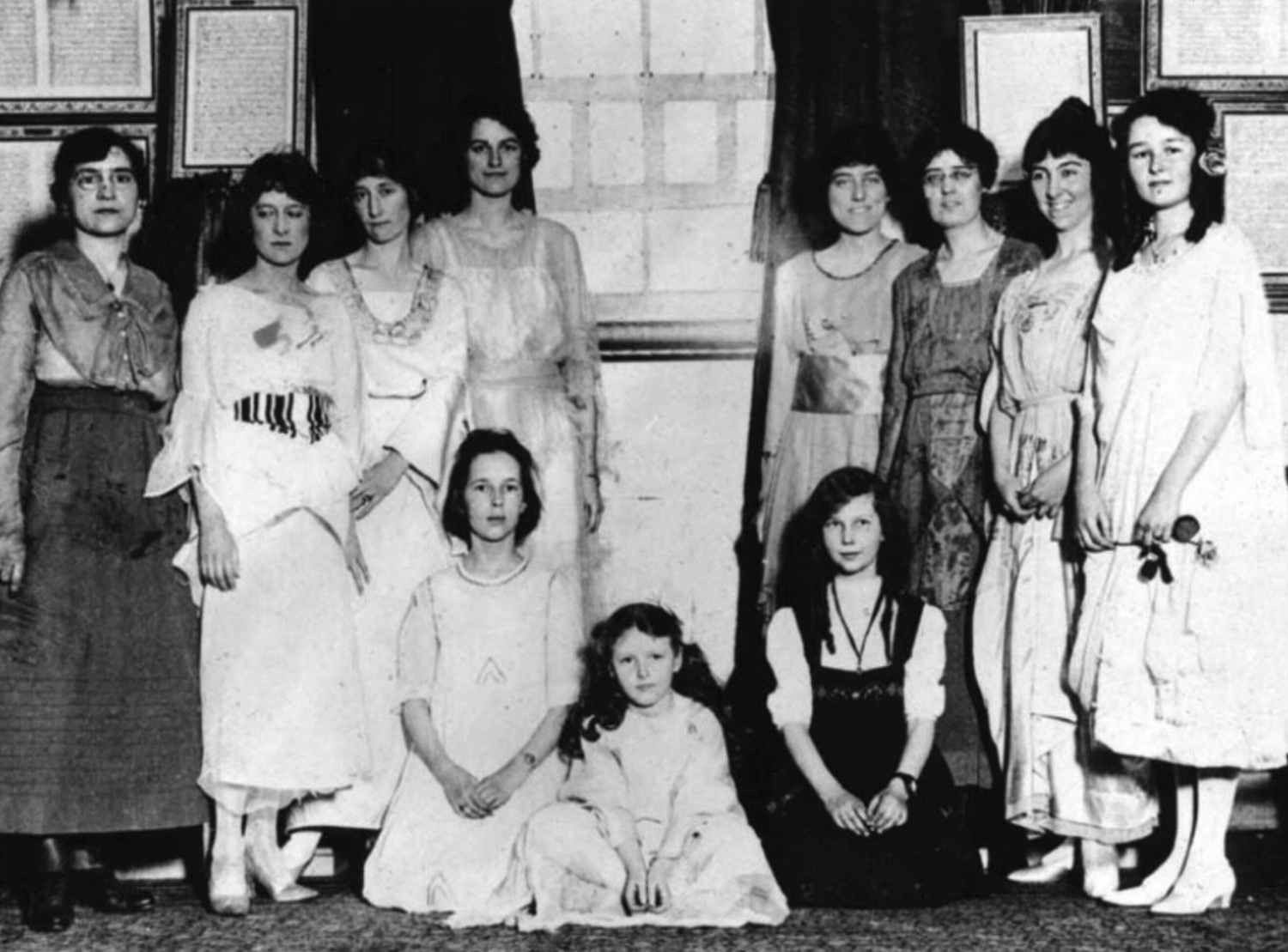
Some of the young girls and women who unveiled the Tablets of the Divine Plan. The Tablets are seen behind them. Mary Maxwell (seated, center)—Shoghi Effendi's future wife, and Hand of the Cause 'Amatu'l-Bahá Ruhiyyíh Khánum—and Elizabeth Coristine (seated, right), unveiled the Tablets addressed to Canada. Seated to the left of Mary Maxwell is Bahiyyih Randall. Source: Baha'i Historical Facts.
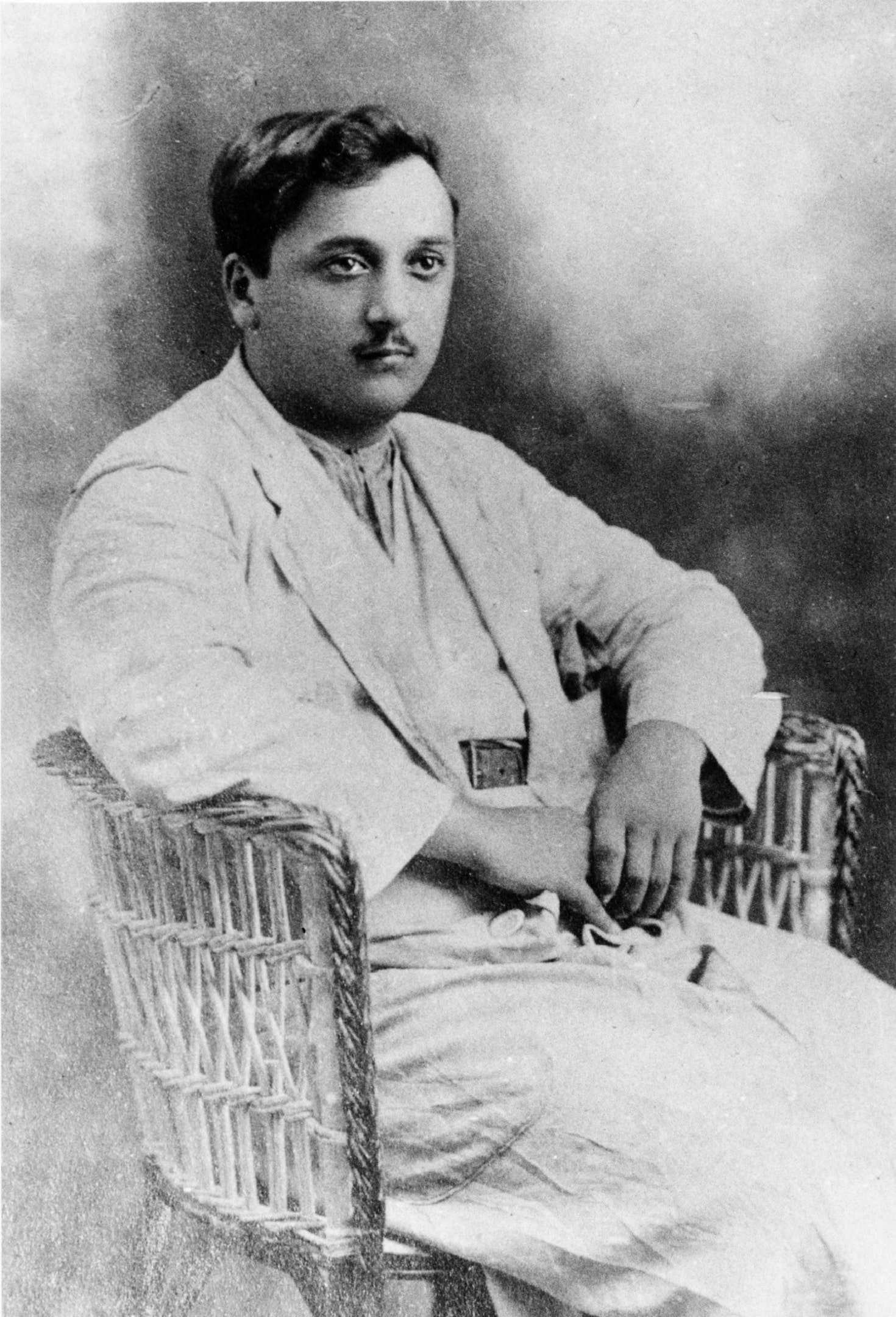
Shoghi Effendi at the age of 22. Source: Bahá'í Media Bank, © Bahá'í International Community 2023.
Another letter of Shoghi Effendi’s that was published in Star of the West was dated 8 May 1919 and addressed to Luṭfu’lláh Ḥakím, the future member of the Universal House of Justice.
Shoghi Effendi gives a concise and vivid picture of 'Abdu'l-Bahá’s heavy workload and the exotic variety of countries from which people are writing to Him:
The Master has been quite busy of late and has revealed many, many Tablets to the friends in America, England, France, Switzerland, Corsica, Germany, Persia, India, Japan, New Zealand and Egypt.
The news Shoghi Effendi shares most joyfully and excitedly is regarding the progress of the Faith in India, where they are about to host their annual national convention:
From India refreshing and encouraging news is being received. The Bahai work is assuming great proportions, is being centralized and is receiving a great impetus from the unceasing and well-directed activities of friends… the friends are stirred and active and are convinced that an increase of energy on their part, a fresh outburst of zeal and ardor and efficient service to the Cause of God will draw Abdul-Baha to their shores.
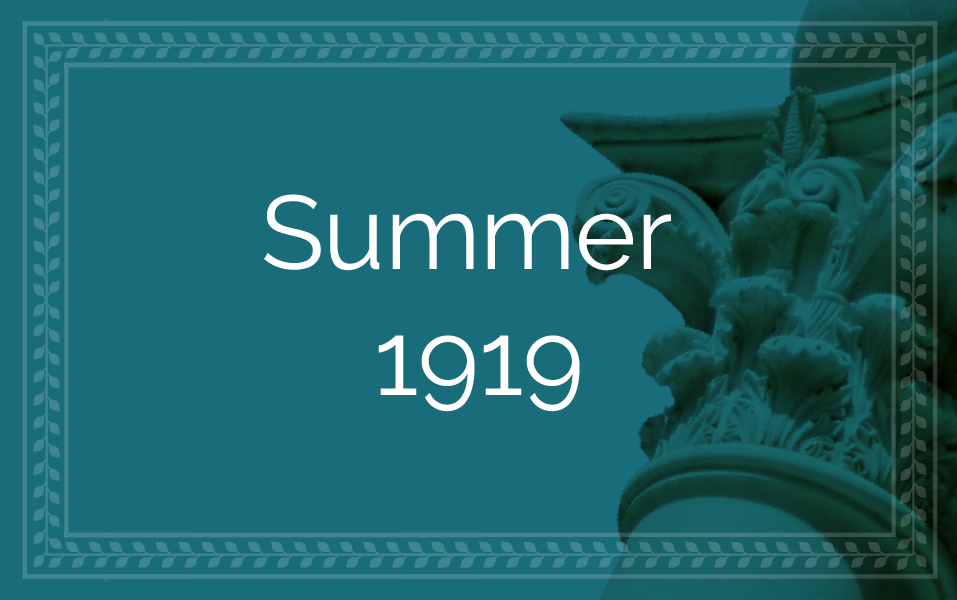
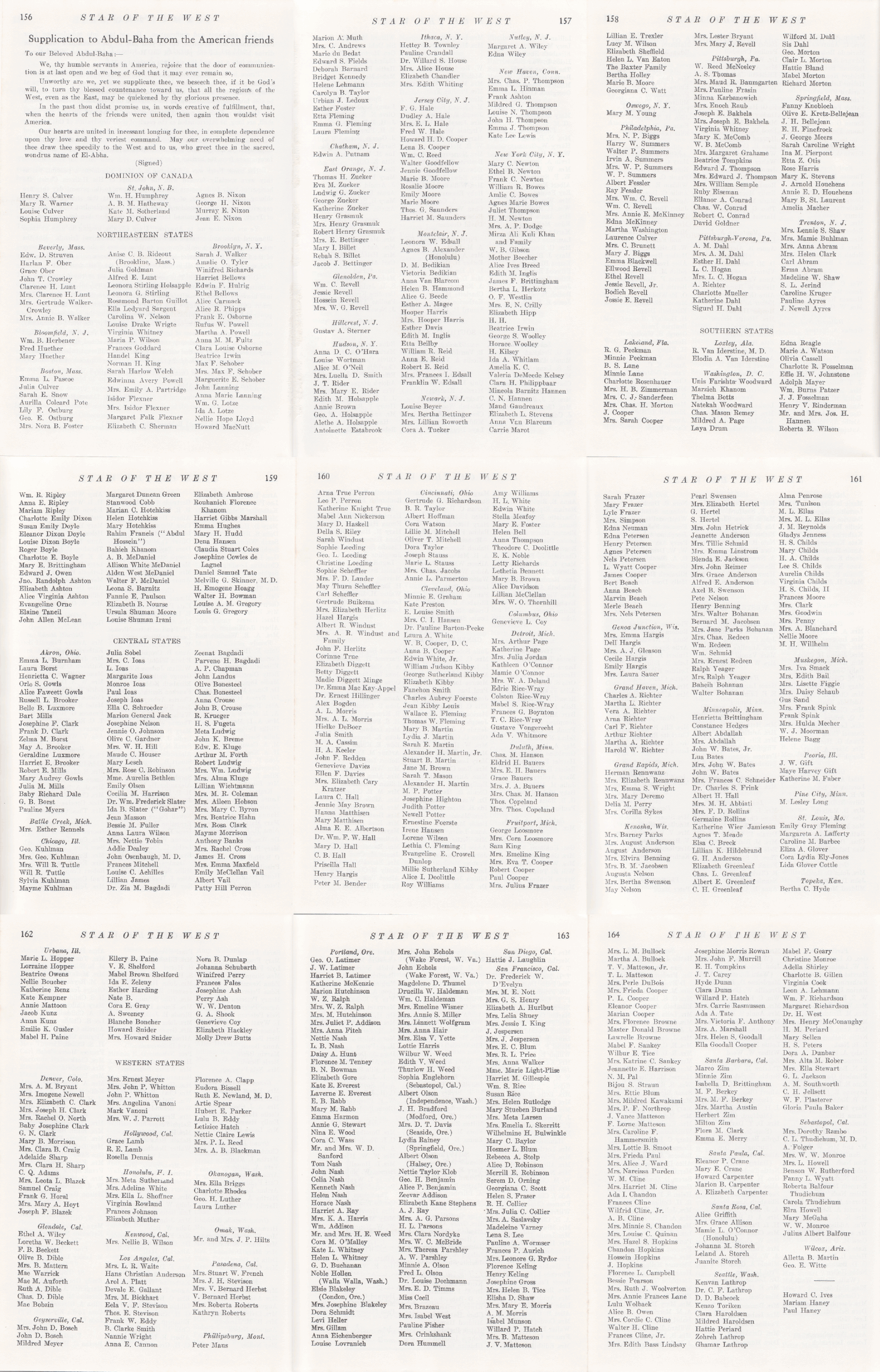
Names of 1,500 American Bahá'ís who signed the supplication to 'Abdu'l-Bahá from all corners of the United States from New Brunswick, Canada to Alabama, and California, Wisconsin, and New York, collected over a period of several weeks between 16 October 1918 and January 1919 and published in Star of the West at 'Abdu'l-Bahá’s request between pages 156-164 of Star of the West Volume 10, Number 8.
This letter, the last published in Star of the West before Shoghi Effendi left the Holy Land for England to pursue his studies focuses, in its entirety, on the supplication 'Abdu'l-Bahá received on the part of 1,500 American Bahá'ís. How this supplication came about is quite interesting.
Carl Scheffler, one of those who signed the supplication, explains to 'Abdu'l-Bahá that the greatest suffering of the Bahá'ís of the United States and Canada was to be cut off from 'Abdu'l-Bahá for nearly five years.
Scheffler describes that when the North American Bahá'í community received news 'Abdu'l-Bahá was safe, news that arrived to them by cable to the British Embassy in the United States, it was as if their worries were suddenly replaced with joy.
The first Feast held in Chicago after hearing the wonderful news was on 16 October 1918. At this Feast, the Bahá'ís decided to write a supplication to 'Abdu'l-Bahá, begging Him to return to America for another proclamation journey.
When the House of Spirituality (the ancestor to the Local Spiritual Assembly) next met, they felt the idea was such an important one, that the entire country should sign the supplication, not just the Bahá'ís of Chicago. The secretary was instructed to send a letter to all the communities in North America and present the matter to them.
The House of Spirituality appointed a committee to assist Jean Masson in drafting the supplication.
It took several weeks to obtain all the signatures, which explains why the supplication wasn’t sent to 'Abdu'l-Bahá until early January 1919. This is the text of the supplication:
To our Beloved 'Abdul-Bahá:
We, thy humble servants in America, rejoice that the door of communication is at last open and we beg of God that it may ever remain so.
Unworthy are we, yet we supplicate thee, we beseech thee, if it be God's will, to turn thy blessed countenance toward us, that all the regions of the West, even as the East, may be quickened by thy glorious presence.
In the past thou didst promise us, in words creative of fulfillment, that, when the hearts of the friends were united, then again thou wouldst visit America.
Our hearts are united in incessant longing for thee, in complete dependence upon thy love and thy veriest command. May our overwhelming need of thee draw thee speedily to the West and to us, who greet thee in the sacred, wondrous name of El-Abhá.
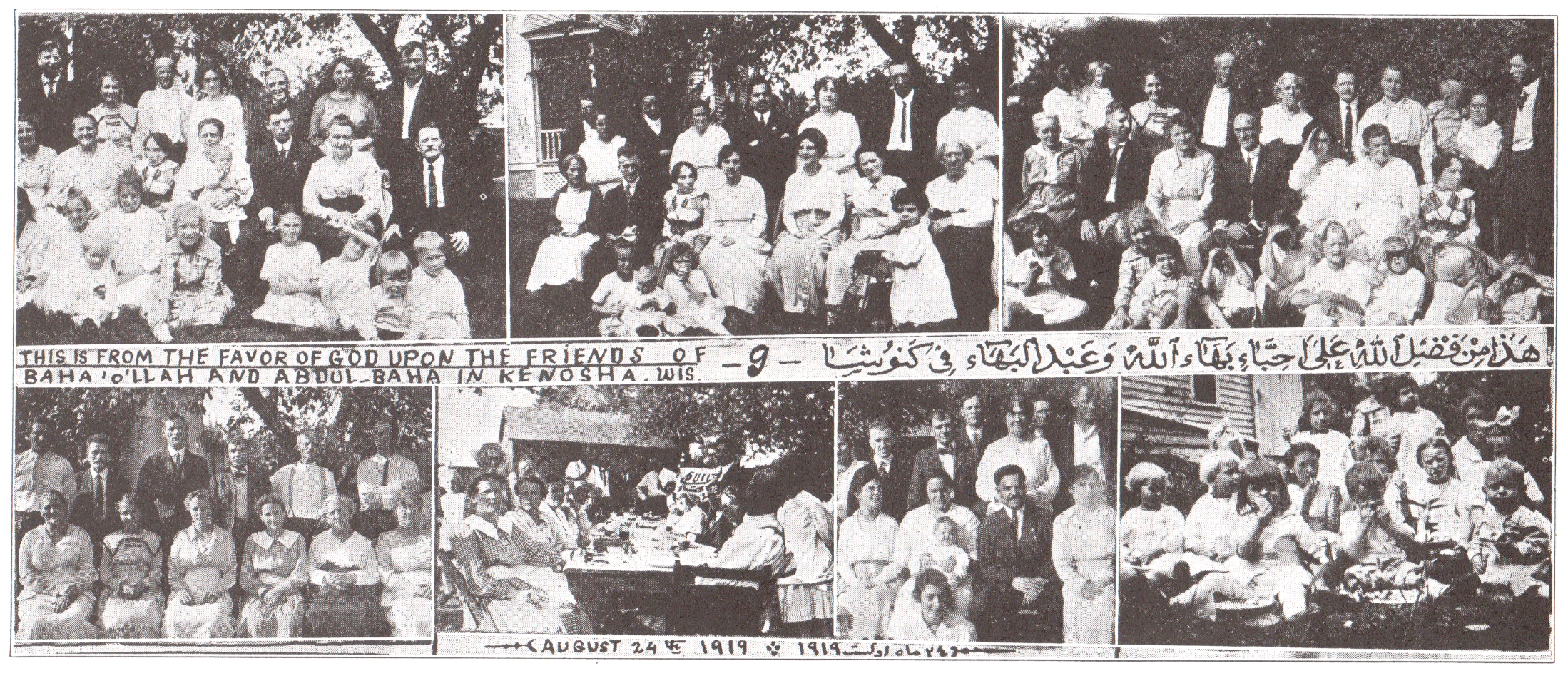
'Abdu'l-Bahá’s mail always contained lovely surprises, and the illustration for this story is simply another beautiful piece of mail 'Abdu'l-Bahá received in 1919, entitled “A day in Kenosha, Wisconsin,” and dated 24 April 1919. In the handwritten left-most section of the photograph is a note from the smiling Bahá'ís, which reads: “This is from the favour of God upon the friends of Bahá'u'lláh and 'Abdu'l-Bahá in Kenosha, Wis.” Source: Star of the West Volume 10, Number 13, page 251.
When 'Abdu'l-Bahá received this historic supplication, he instructed His grandson very specifically on how it should be published, and this is the heart of this letter written by Shoghi Effendi.
In essence, 'Abdu'l-Bahá wished for the text of the supplication to be printed in both English and Persian in that same issue of Star of the West. In addition, the names of the 1,500 American and Canadian Bahá'ís who had signed the letter was to also be printed, both in English and in Persian, in the same issue of the magazine, and, as Shoghi Effendi clearly points out, “no matter how voluminous it may become.”
Issue 8 was 32 pages, double the length of a regular Star of the West issue.
'Abdu'l-Bahá also gave directives that at least a couple of copies of the issue containing the supplication along with a photograph of the 1919 American convention should be forwarded to Persia, and addressed to Bahá'í individuals and Assemblies, in order, as Shoghi Effendi writes,
that all Persian Bahais may see what miracles have been wrought, what achievements have been made, what victories have been won, what a universal, a simultaneous response to the trumpet call of service has taken hold of the western friends.
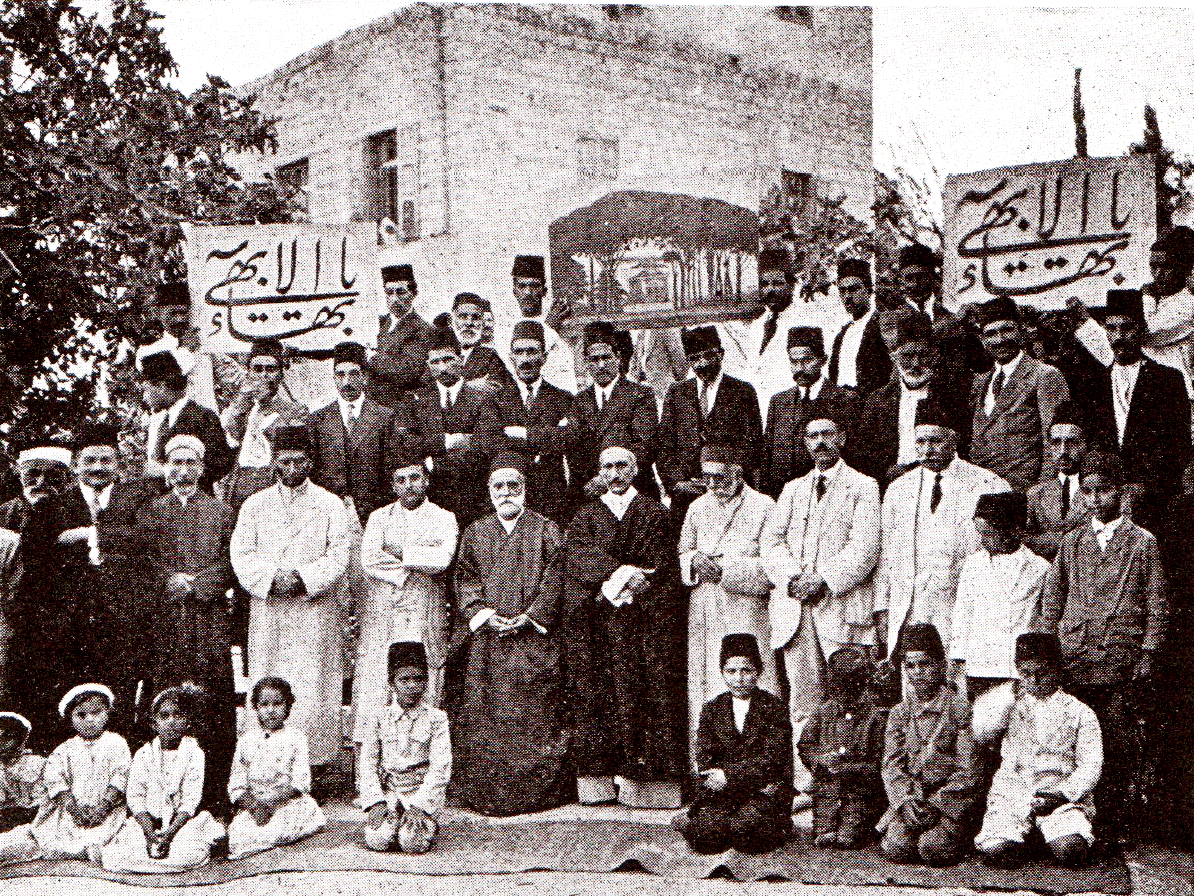
Shoghi Effendi dressed all in white with a black fez, arms crossed, fifth from the left, standing with pilgrims in front of the Shrine of the Báb on Mount Carmel. Photograph sent to Star of the West by Shoghi Effendi. Source: Star of the West Volume 10, Number 13, page 242.
Shoghi Effendi’s long work hours, and his habit of working at all hours, from the early morning to the middle of the night was yet another characteristic he shared with his Beloved Grandfather.
On 24 August 1919, as Shoghi Effendi described in a letter he wrote to his friend. ‘Alí Yazdí he was still in bed, sleeping, when 'Abdu'l-Bahá woke him up with a gentle knock on His grandson’s door, and with His sweet voice, calling Shoghi Effendi to wake up, shake off his slumber and attend to his work. Shoghi Effendi was utterly delighted.
Serving 'Abdu'l-Bahá was Shoghi Effendi’s highest aspiration, his ultimate calling, and service was his only joy. He repeated all the time, during those blessed years when he was 'Abdu'l-Bahá’s private English secretary:
I am in the service of my Beloved.
These were the days in Shoghi Effendi’s life when he was most blissfully happy. They would never return to him.
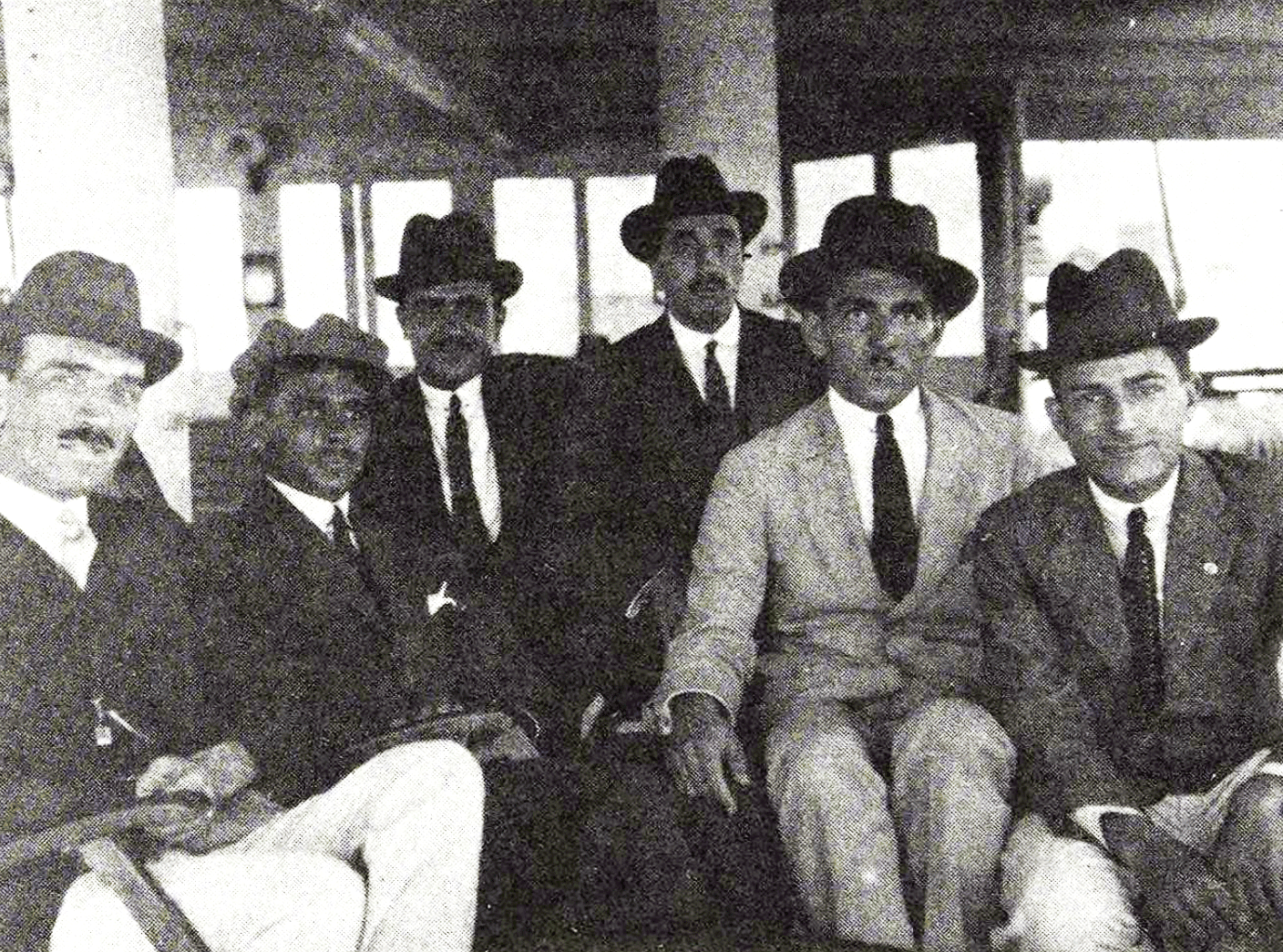
Bahá'í students from the Syrian Protestant College en route to Germany after World War I, at 'Abdu'l-Bahá's instructions. ‘Alí Yazdí is third from the left.. Source: Blessings Beyond Measure, ‘Alí Yazdí, page 66.
Over the summer of 1919, one by one and several at a time, all of Shoghi Effendi’s classmates, his close group of friends from Beirut and Syrian Protestant College, were leaving for university, traveling to Persia, Europe, and America.
It was depressing to Shoghi Effendi to witness his friends scattering to all parts of the globe, the end of a happy era of closeness and companionship. For years, these young men had grown intimate, been close friends, studious classmates, and they were held together by affectionate bonds of fellowship, common interests, and, of course, their love for the Faith and their desire to serve 'Abdu'l-Bahá.
The student Bahá’í group at Syrian Protestant College—that bonded group of brilliant, active, and upright young men who had stayed close through the four years of World War I—was now splitting up.
Shoghi Effendi’s only consolation in this time of many farewells to close friends was the thought that each one of them, in their own way, in their own sphere of action would render service to the Faith.
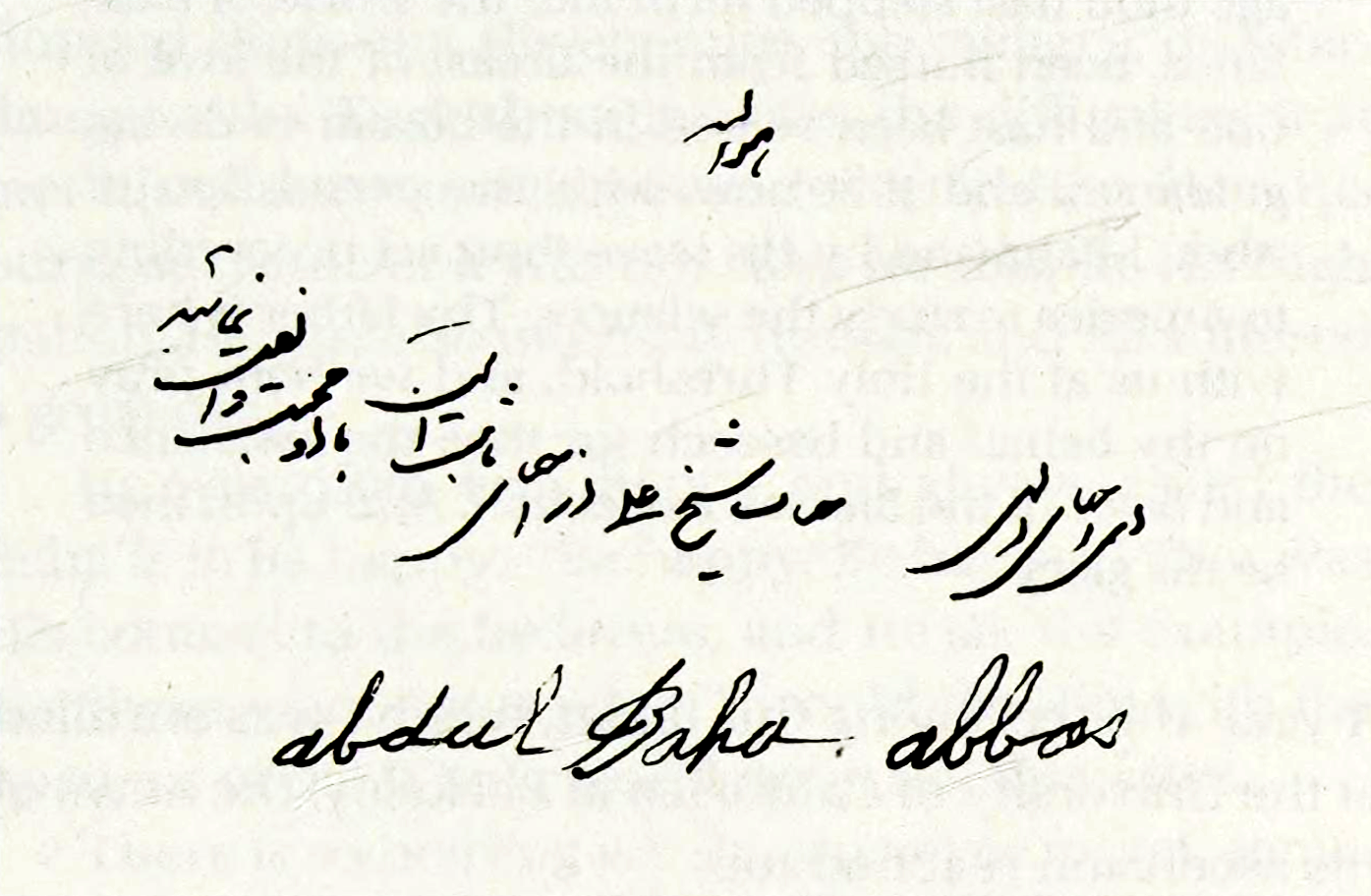
Personal letter of introduction revealed by 'Abdu'l-Bahá and signed in His own hand to the Bahá'ís of Germany for ‘Alí Yazdí, the close friend of his beloved grandson. Source: Blessings Beyond Measure, ‘Alí Yazdí page 43.
After graduation, ‘Alí Yazdí had returned home to Damascus until the end of the war. He had studied civil engineering at Syrian Protestant College and had gotten a job as a draftsman for the Government, earning little and saving even less. By the summer of 1919, ‘Alí, now 20 years old, was pinching pennies, but he didn’t have enough money for graduate school.
'Abdu'l-Bahá learnt of ‘Alí Yazdí’s financial predicament and offered him £100—£6,300 in today’s currency—for him to continue his studies at the Technische Hochschule in Berlin. 'Abdu'l-Bahá’s generous gift made ‘Alí Yazdí’s dream a reality, and he wasted no time, leaving Damascus as soon as he could for Haifa, to bid farewell to 'Abdu'l-Bahá and Shoghi Effendi before starting university. He arrived on 24 August 1919, and it would be the last time he ever saw 'Abdu'l-Bahá.
‘Alí Yazdí only stayed in Haifa for two or three days, and, just before he left, 'Abdu'l-Bahá called him into His room where he was alone with Shoghi Effendi. 'Abdu'l-Bahá invited ‘Alí to sit, and asked Shoghi Effendi to serve his friend some tea. The Master gave ‘Alí Yazdí life advice and told him that he had high hopes for him, telling him:
You are a good boy, Shaykh ’Alí.
The tea Shoghi Effendi served ‘Alí was boiling hot and he couldn’t drink it, but 'Abdu'l-Bahá said:
Drink! Drink your tea!
So ‘Alí drank the boiling tea! At the end of their meeting, 'Abdu'l-Bahá gave ‘Alí His blessing, stood up and called the young man over to him. 'Abdu'l-Bahá embraced ‘Alí Yazdí in His arms and kissed him on both cheeks.
‘Alí Yazdí never saw 'Abdu'l-Bahá again but the Master had personally written him a letter of introduction to the Bahá'ís of Germany:
O ye friends of God! His honor Shaykh-’Alí is one of the firm friends; exercise toward him love and kindness.
Alí Yazdí left Haifa by train for Port Said, Egypt, and Shoghi Effendi came to the station to see ‘Alí and five other friends off. Shoghi Effendi loved his friend so much that he sat in the compartment until the train was about to leave, then, he said goodbye and asked ‘Alí to write to him. After Port Said, they would make their way to Alexandria and board a small, old Italian ship bound for Venice where each would go his own way.
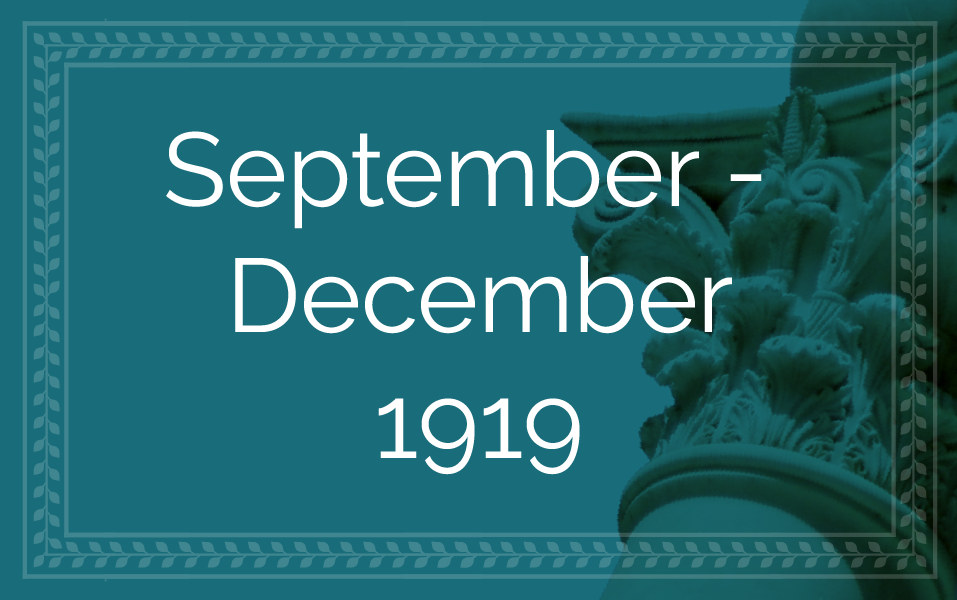
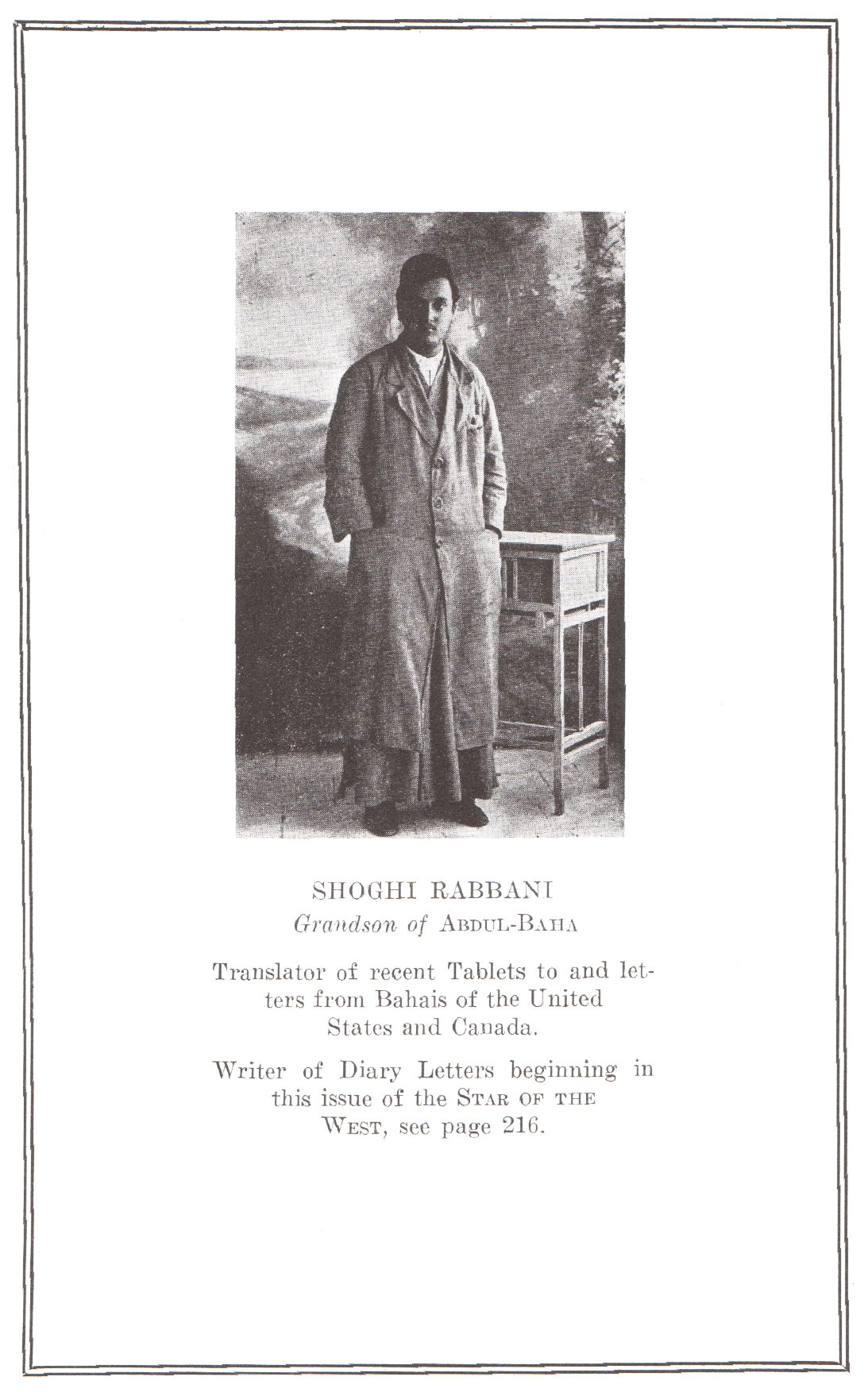
Shoghi Effendi, Grandson of 'Abdu'l-Bahá. Source: Star of the West Volume 10, Number 11, page 210.
On 27 September 1919, approximately a year after Shoghi Effendi began working full-time in service to 'Abdu'l-Bahá, Star of the West, published a full-length photograph of Shoghi Effendi in its issue of 27 September 1919.
The photograph was captioned:
Shoghi Rabbani, Grandson of 'Abdu'l-Bahá
Translator of recent Tablets to and letters from Bahais of the United States and Canada.
Writer of Diary Letters beginning in this issue of the STAR OF THE WEST, see page 216.
The first “diary letter” from Shoghi Effendi is dated 8 February 1919 and begins with a very long quote from a Tablet revealed by 'Abdu'l-Bahá the previous day, 7 February 1919, on the future development of the Faith.
Perhaps even more fascinating than the story itself is a comment by Amatu’l-Bahá Rúḥíyyih Khánum regarding the photograph of Shoghi Effendi and his public introduction to the Bahá'ís of the United States and Canada in Star of the West.
Rúḥíyyih Khánum believes that 'Abdu'l-Bahá Himself directed Shoghi Effendi to make sure the photograph and title were published, in order, she believes, to publicly clarify their family relationship.
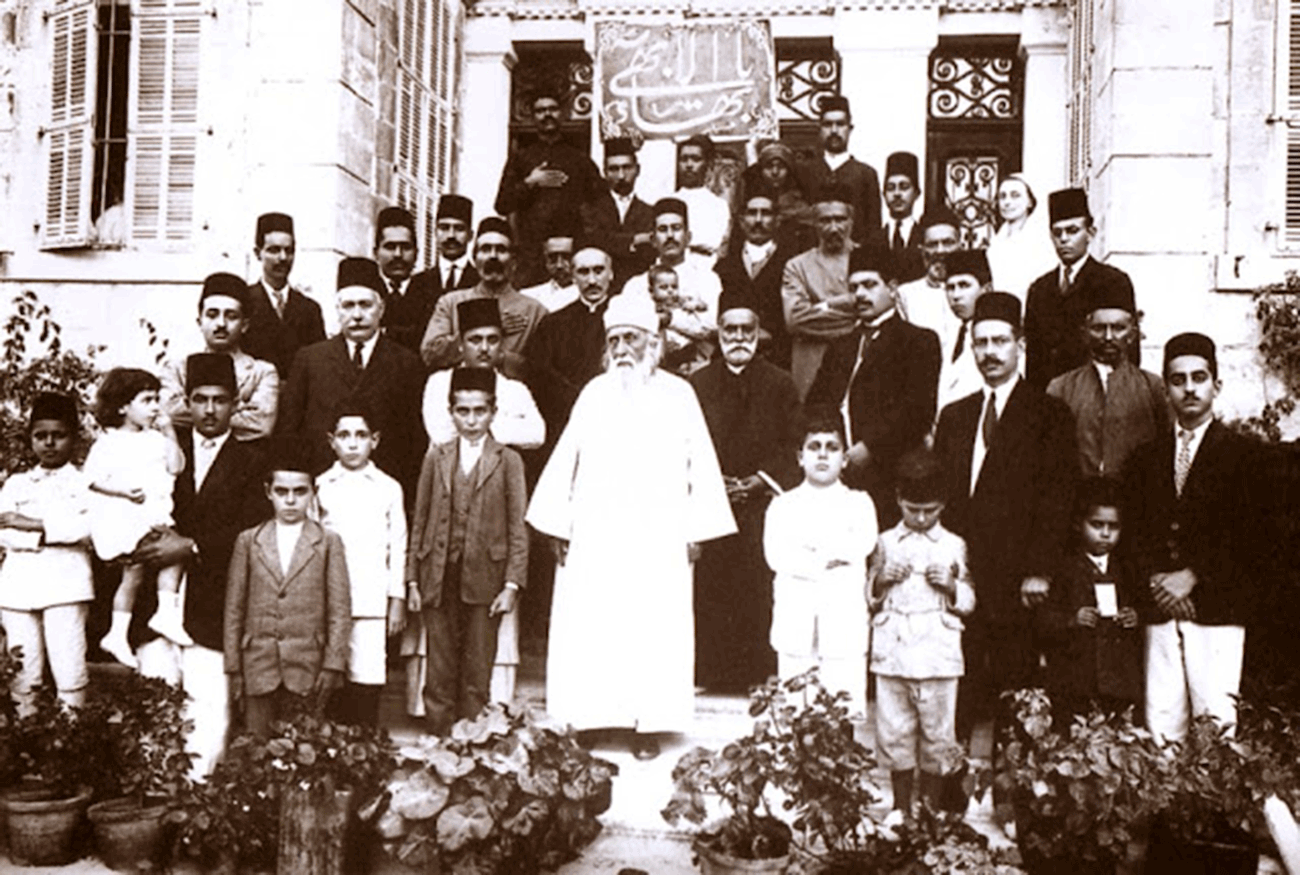
Shoghi Effendi, standing to the left and one row back from 'Abdu'l-Bahá with a group of pilgrims on 2 October 1919. Source: 'Abdu'l-Bahá in the Holy Land.
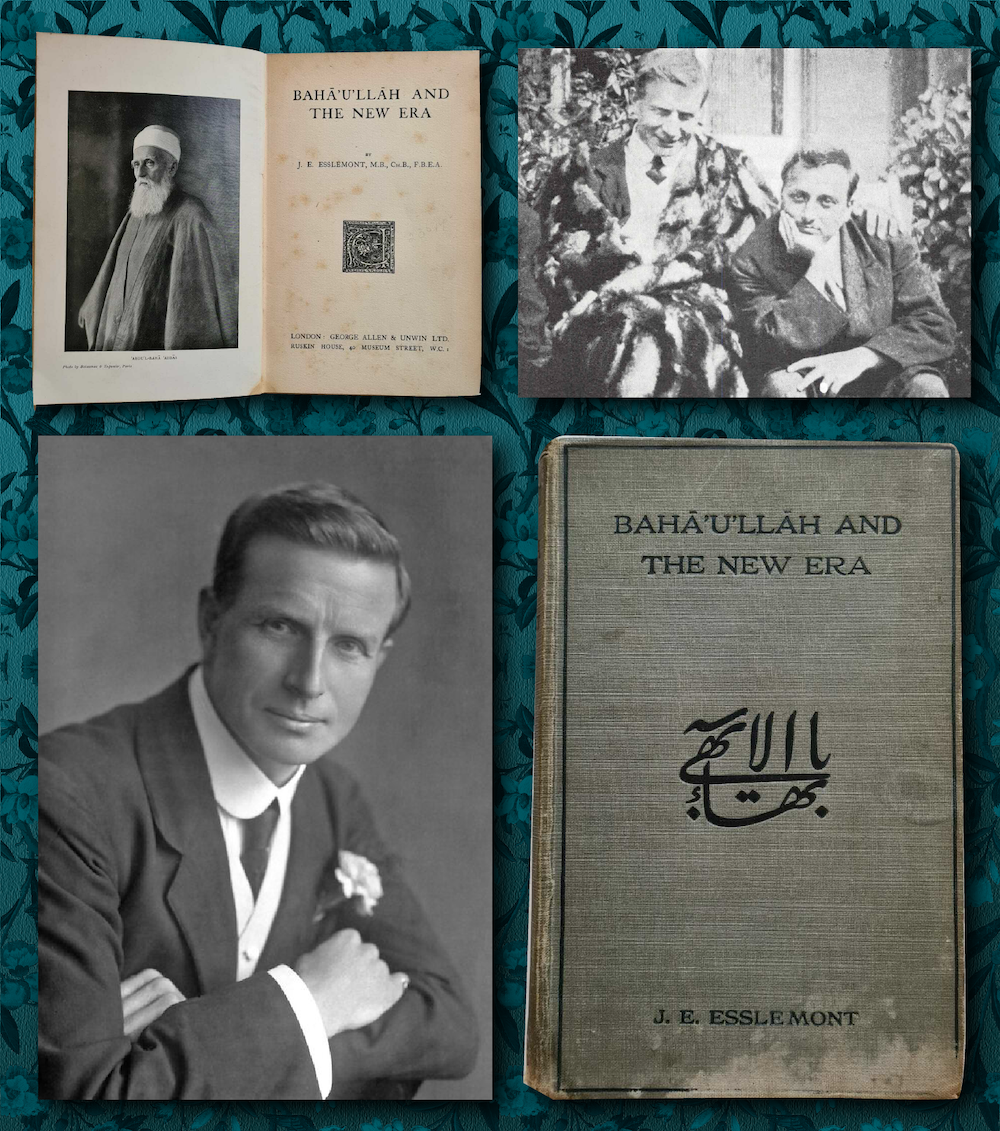
Frontispiece of the First Edition of Bahá'u'lláh and the New Era (1923), Source; Dr. John E. Esslemont and young Shoghi Effendi in Haifa in 1919-1920, Bahaipedia; A portrait of Dr. Esslemont, Bahaipedia; Cover of the First Edition of Bahá'u'lláh and the New Era (1923), Source.
Dr. John E. Esslemont was born in Scotland, and from an early age, became interested in a wide variety of subjects and religious beliefs until he encountered the Bahá'í Faith. He was a well-read and well-educated man who spoke fluent French, German, Spanish, and Esperanto, and he began learning Arabic and Persian very soon after he became a Bahá'í in March 1915, in order to access the Holy Writings in their original languages.
By October 1916, Dr. Esslemont had already started working on Bahá'u'lláh and the New Era, and had begun a correspondence with Shoghi Effendi which the future Guardian hoped would be “continuous, inspiring and regular.”
In early January 1919, Dr. Esslemont received from Shoghi Effendi a Tablet revealed in his honor by 'Abdu'l-Bahá, in which the Master hoped Esslemont would “become a torch …so that light and knowledge might shine out” from him, adding, “concerning the book you are editing, send me a copy thereof.”
Dr. Esslemont immediately forwarded 'Abdu'l-Bahá the first nine chapters of Bahá'u'lláh and the New Era, and mentioned he has committed 'Abdu'l-Bahá’s Tablet to him to memory.
When Bahá'u'lláh and the New Era was nearly finished, Dr. Esslemont at long last arrived in Haifa for pilgrimage. Although he was often ill with dysentery and confined to bed for several days, he developed a close friendship with Shoghi Effendi, and managed to take meticulous notes for his book, questioning dozens of illustrious early Bahá'ís, gathering information, and accumulating material, most of which came directly from 'Abdu'l-Bahá, in after-dinner conversations.
On 5 December, Dr. Esslemont and 'Abdu'l-Bahá took a drive through the rain. 'Abdu'l-Bahá taught him a few words of Persian, and Dr. Esslemont taught 'Abdu'l-Bahá a few words of Esperanto. A few days later, 'Abdu'l-Bahá, Shoghi Effendi, Dr. Esslemont and Luṭfu’lláh Ḥakím visited ‘Akká, the Garden of Riḍván, and the Shrine of Bahá'u'lláh.
Bahá'u'lláh and the New Era would be published in September 1923, and the impact of the book at the time of its publication was nothing short of monumental, spreading accurate information, most of it reviewed by 'Abdu'l-Bahá Himself, about the Bahá'í Faith worldwide.
Shoghi Effendi would later call Bahá'u'lláh and the New Era “the textbook of the Bahá'í Faith,” and would actively promote its translation and publication in many languages.
Shoghi Effendi also described “the pure intention” Dr. John E. Esslemont in writing Bahá'u'lláh and the New Era.
Dr. John E. Esslemont was the very first Hand of the Cause whom the Guardian raised posthumously in 1925.
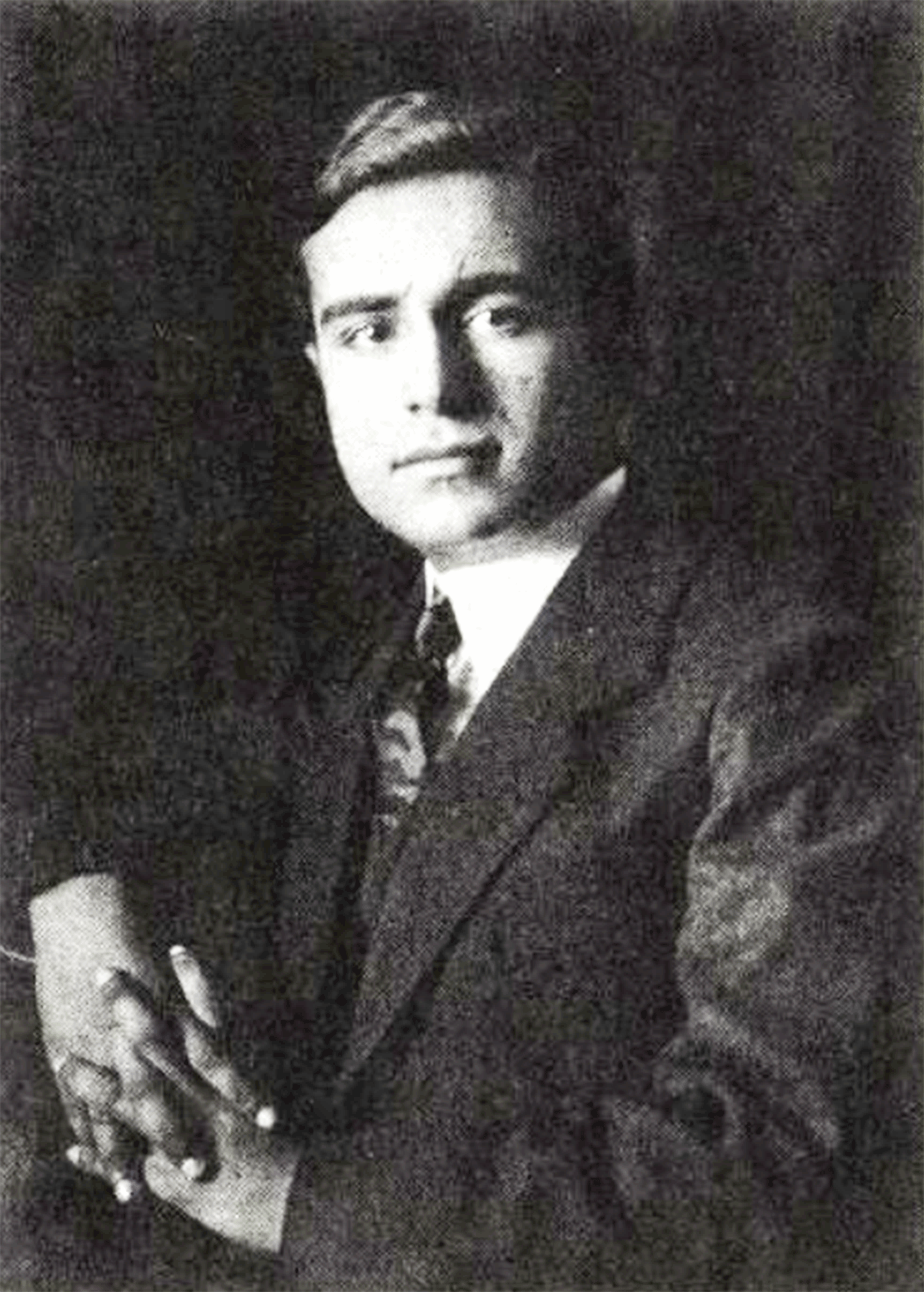
‘Alí Yazdí in Germany. Source: Blessings Beyond Measure, ‘Alí Yazdí, page 68.
After ‘Alí Yazdí had arrived in Germany, he received a letter from Shoghi Effendi dated 9 December 1919:
For a long time have I awaited your letters as I was in the dark as to your whereabouts. But now that your father has come for a few days from Damascus, I secured your address and I am sending you herewith some news of the Holy Land.
Shoghi Effendi shared news of 'Abdu'l-Bahá: the Master was in the best of health, and so were the pilgrims and resident Bahá'ís. Shoghi Effendi shared news of ‘Alí’s family, who, by this time, had moved to Haifa at the invitation of 'Abdu'l-Bahá Himself. He told ‘Alí, his “dear and devoted” father Ḥájí Muḥammad Yazdí was “as ever warmhearted, loving, rosy-checked, and in full bloom,” and that his brother’s studies at Syrian Protestant College were going very well, and that he had just heard that he was growing in height.
As for Shoghi Effendi, he was still doing the same wonderful work in the same room ‘Alí knew. From his earliest years, Shoghi Effendi had a wonderful sense of humor and loved to tease those he cared about the most. ‘Alí Yazdí was no exception, and Shoghi Effendi ended his letter teasing him, calling him Shaykh ‘Alí, as 'Abdu'l-Bahá had on their last meeting in Haifa:
So please write me and forget me not as I do not and cannot forget the dear Shaykh!
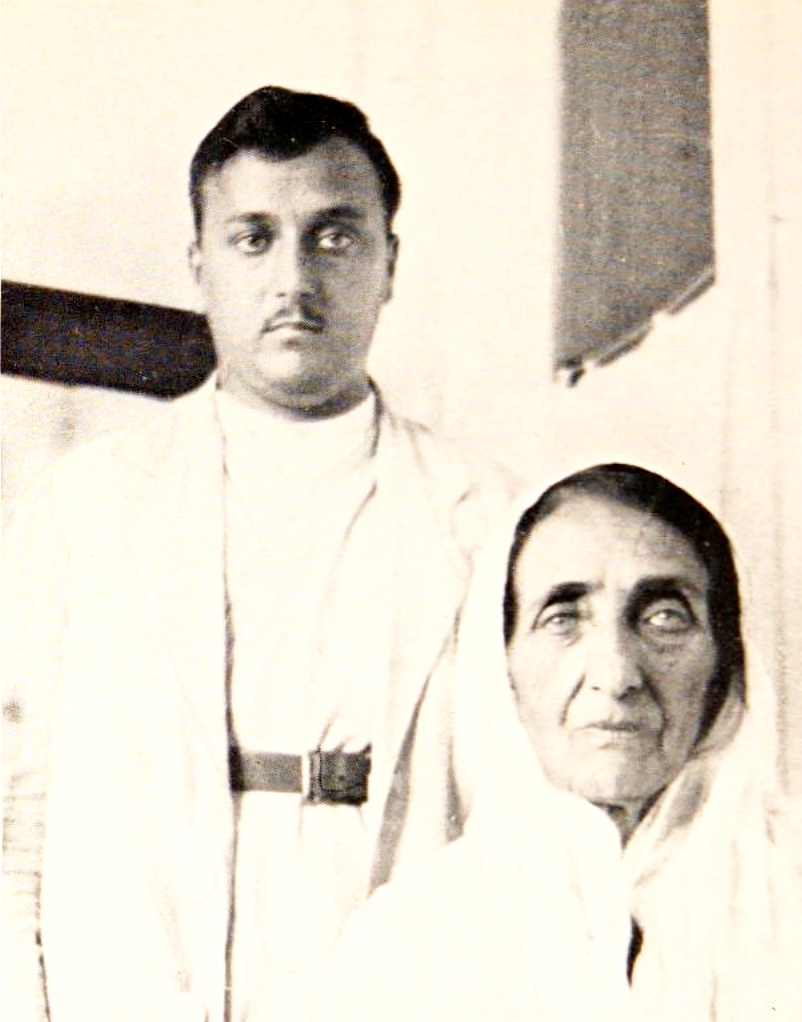
Shoghi Effendi and the Greatest Holy Leaf some time between 1918 and 1920. Source: The Priceless Pearl, between pages 168 and 169.
Eight days after his first letter to ‘Alí Yazdí in Berlin, Shoghi Effendi wrote another one where he shared more about what was happening in Haifa and how busy he was and how bustling Haifa had become with the arrival of 50 pilgrims:
We are exceedingly busy here. Some fifty pilgrims, Arabs, Kurds, Persians, Americans, Europeans, and Japanese. How we miss you and the dear Trio, Bakers & Co.;
The Bakers & Co. Trio was evidently a cute nickname Shoghi Effendi, ‘Alí Yazdí and their friends had come up with. One member of this endearing trio was named Áqá Mírzá Muḥammad-Báqir Khán, and was in India, but Shoghi Effendi had no news of the other two, even after having sent many letters.
'Abdu'l-Bahá had been revealing wonderful Tablets to Bahá'ís in Germany including Consul and Mrs. Schwarz, Mr. and Mrs. Herrigel, Miss Knobloch and Pastor Hydron.
‘Alí had sent a letter to Shoghi Effendi from Stuttgart on 27 November 1919, and had read it to 'Abdu'l-Bahá, Who, in response, had revealed a Tablet for ‘Alí Yazdí in His own handwriting and addressed to the Bahá'ís in Germany, which Shoghi Effendi was now enclosing in his letter, and asked ‘Alí to let the Bahá'ís know of this bounty 'Abdu'l-Bahá had bestowed on them.
One can sense the love of Shoghi Effendi for ‘Alí Yazdí, whom he considered a brother, in his closing greeting:
Give please my love to all the brothers and sisters in Stuttgart, I am ever your brother, Shoghi.
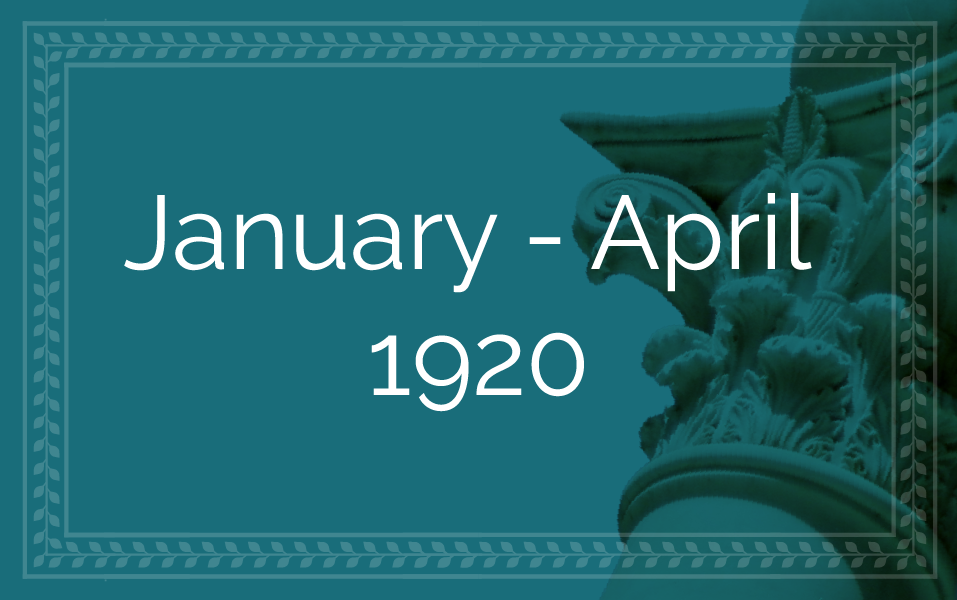
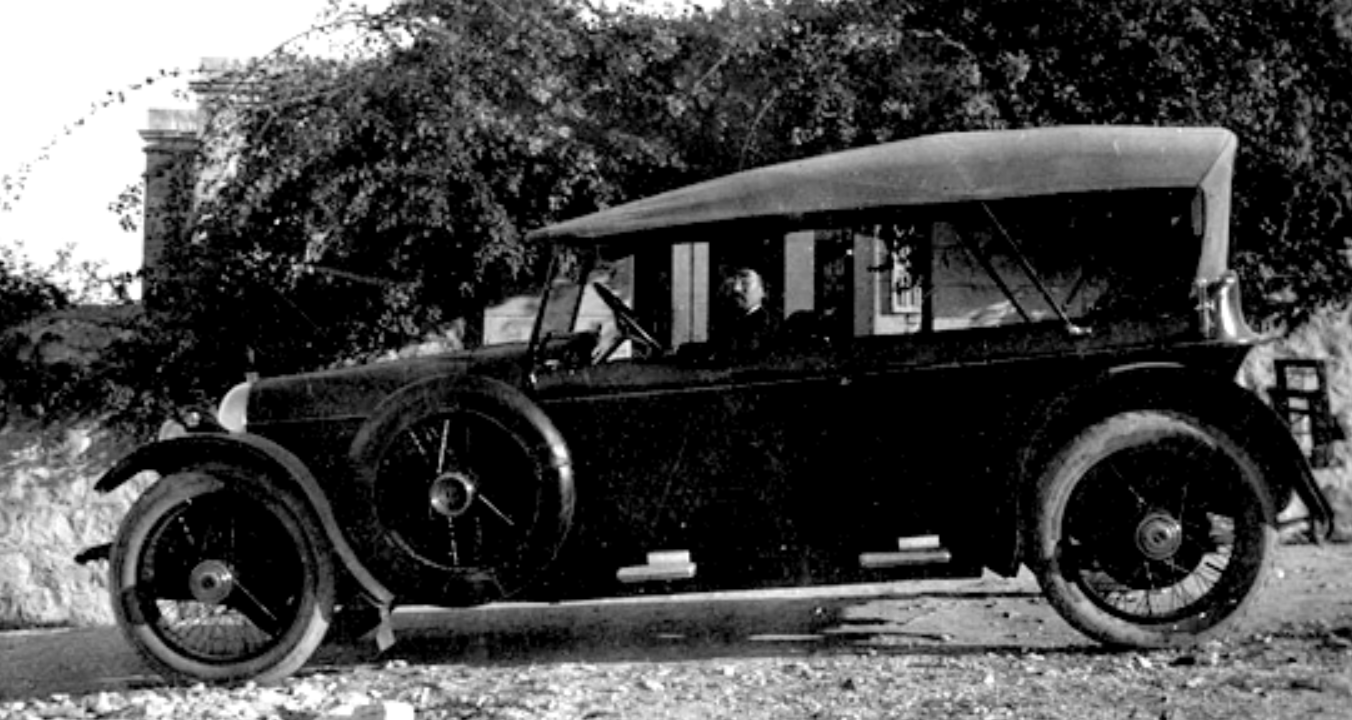
'Abdu'l-Bahá's Cunningham automobile, the 7-passenger touring car gifted by Ella Goodall, with Saichiro Fujita behind the wheel. Source: 239 Days.
In January 1920, along with an arrival of new pilgrims, was another arrival of an entirely new sort: the arrival of 'Abdu'l-Bahá's hand-built seven-seater Cunningham automobile. Cunningham automobiles were one of the earliest vehicles in the advent of the automotive age, and the Master's Cunningham automobile was a gift from Ella Goodall Cooper. The car, at the time, cost around $70,000—$100,000 today.
Saichiro Fujita, who had been invited by ‘Abdu'l-Bahá to come and live in the Holy Land, accompanied the automobile from the United States to Haifa, where he stayed on as one of the drivers and mechanics. When the automobile arrived in Haifa, ‘Abdu'l-Bahá instructed Shoghi Effendi to have it cleared through customs and delivered to His home.
Although the automobile arrived on a weekend, Shoghi Effendi succeeded in getting it delivered to 'Abdu'l-Bahá. When the car was outside the Master’s house, Shoghi Effendi went to His grandfather and informed Him the car had arrived. ‘Abdu’l-Bahá was very surprised and deeply pleased and asked Shoghi Effendi how he managed to do this on a weekend.
Shoghi Effendi replied that he had taken the papers himself to the homes of various city officials and asked them to sign the documents and give the necessary orders to immediately release the car into Sir ‘Abdu'l-Bahá ‘Abbás’ possession.
‘Abdu'l-Bahá would eventually ride in the Cunningham automobile on occasions but it would predominantly be used to transport pilgrims. The automobile was too wide for Haifa's narrow streets and therefore was confined to one-way streets. It was also too wide to drive through 'Akká's city gate. At times ‘Abdu'l-Bahá would join the pilgrims in the automobile for a drive up Mount Carmel to look at the view of the Mediterranean.
In her biography of Shoghi Effendi, The Priceless Pearl, Rúḥíyyih Khánum made a stunning point:
This was typical of the way Shoghi Effendi did his work throughout his entire life. He always wanted everything done at once, if not sooner, and everything he had any personal control over progressed at that speed.
In essence, in managing to clear the Master's car through customs on a weekend, at ‘Abdu'l-Bahá's express instructions, we see perhaps a training moment between Grandfather and grandson, between Center of the Covenant and future Guardian of the Faith. But this vignette was also a brief snapshot of what the Guardian was like, just two years before those immense responsibilities fell on his shoulders.
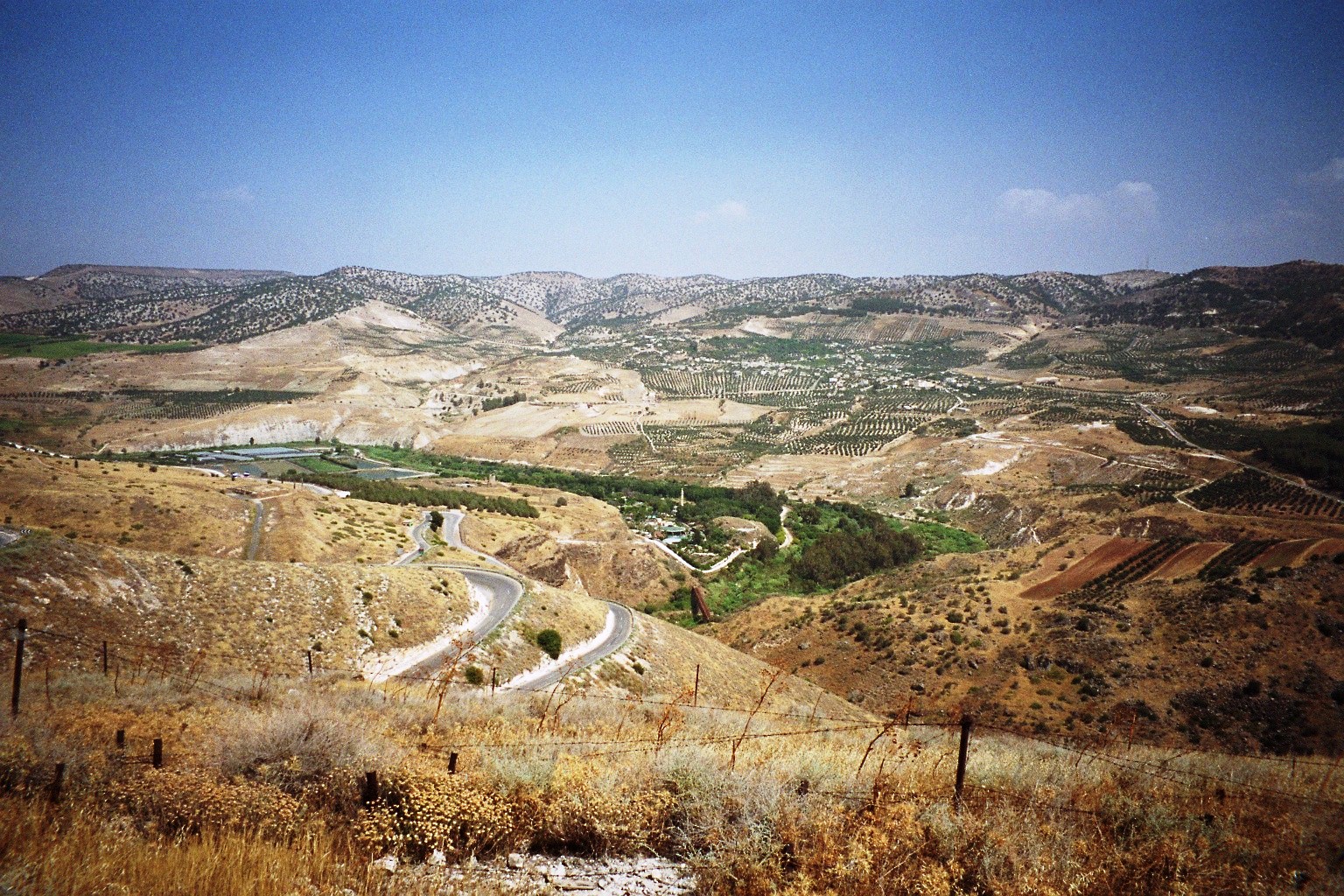
There are no current or past photographs of the fields and landscape around 'Adasiyyíh but this photograph of fields and valleys in Hamat Gader is very close. This photograph is taken less than five kilometers away from the lands of 'Adasiyyíh. Source.
Sometime in 1920, ‘Abdu'l-Bahá paid His fourth and last visit to ‘Adasiyyíh for a single day and night. Before He arrived, Bedouins (nomadic Arab tribes) had invaded the village but the Bahá'ís had not been harmed, even though the Bedouins outnumbered them. Soon after His arrival, ‘Abdu'l-Bahá informed the Bahá'í farmers that the purpose of His visit was to put in place a permanent arrangement with them.
Shoghi Effendi accompanied 'Abdu'l-Bahá on His last visit to ‘Adasiyyíh, and rode on horseback with his Grandfather through the area.
During the course of this short visit, ‘Abdu’l-Bahá reduced His share of the farmer’s profits—the War was over, His needs had decreased and He felt it was fair— and emphasized to the Baha’is the importance of daily devotional gatherings and practicing consultation to resolve disputes. He also left His beloved farmers with wise economic advice, recommending they pay their laborers a percentage a share of their profits.
The Local Spiritual Assembly of the Bahá'ís of ‘Adasiyyíh would be formed four years later, in 1924, under the ministry of Shoghi Effendi.
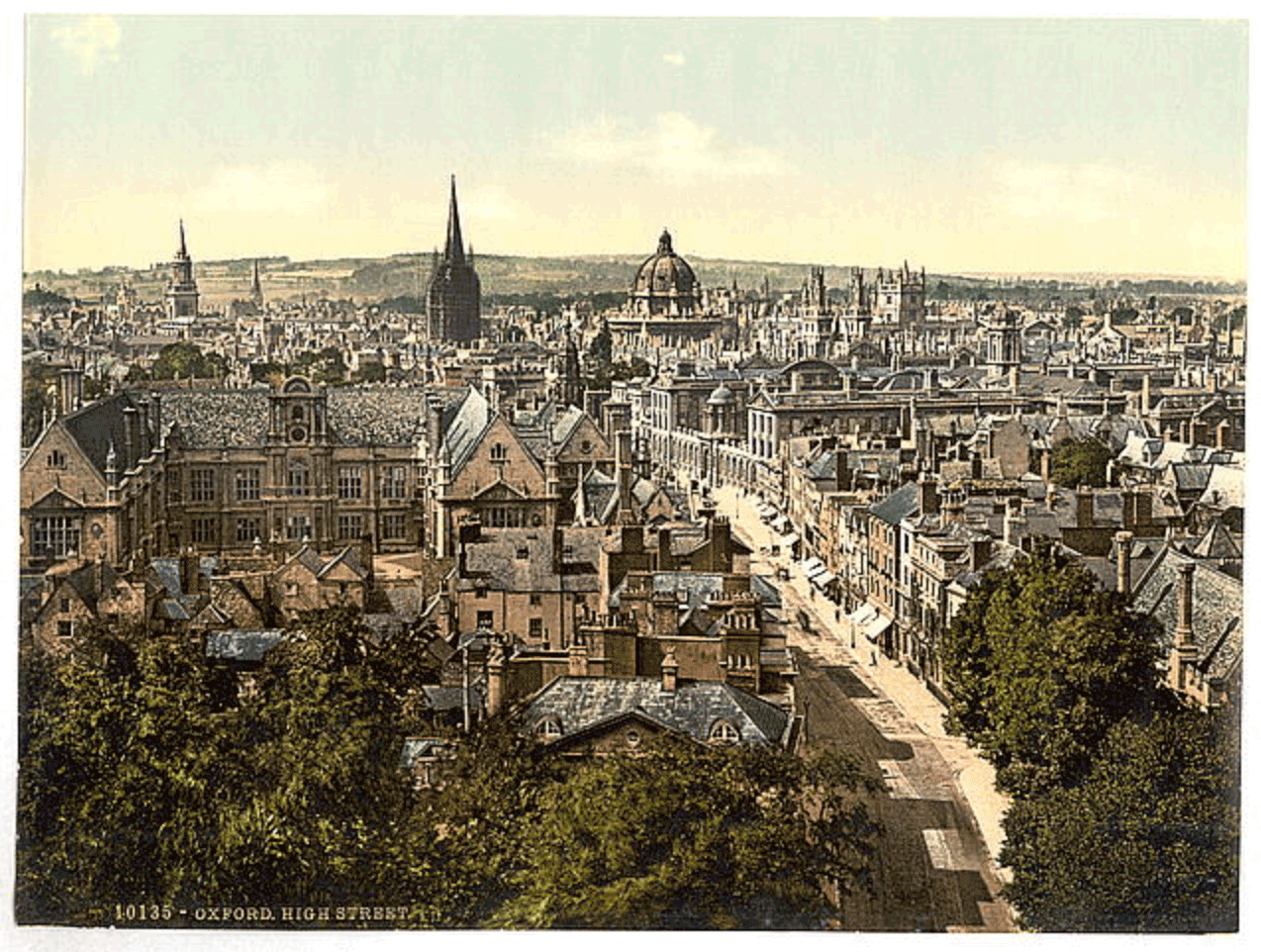
A vintage postcard of Oxford High Street in Oxford, England between 1890 and 1900. Source: Library of Congress.
'Abdu'l-Bahá had decided long ago, as far back as 1910, that His grandson would attend Oxford University, and 'Abdu'l-Bahá had requested His friend, Lord Lamington, a distinguished Scottish Lord and a man who deeply respected and admired Him, to use his influence in getting Shoghi Effendi admitted to a college at Oxford.
By early 1920, 'Abdu'l-Bahá had decided that Shoghi Effendi should go to England sooner rather than later. The reason that Shoghi Effendi was to attend Oxford was to perfect his command of English to the highest possible degree, in order to translate the Tablets of 'Abdu'l-Bahá and the Bahá'í Holy Writings into flawless English.
Outwardly, it would have looked like this was not the ideal time of Shoghi Effendi to leave 'Abdu'l-Bahá’s service, given that the Master’s postwar correspondence was steadily increasing, but the decision for Shoghi Effendi to leave was made based on several factors.
- First, the sooner Shoghi Effendi left to pursue his studies, the better, because the sooner he would be finished.
- Second, there were already several people who were acting, along with Shoghi Effendi, as 'Abdu'l-Bahá’s secretaries.
- Third, Shoghi Effendi’s eldest cousin had just finished his studies in Beirut, and was now living and serving in Haifa.
- The fourth reason is studied in greater detail in the next story.
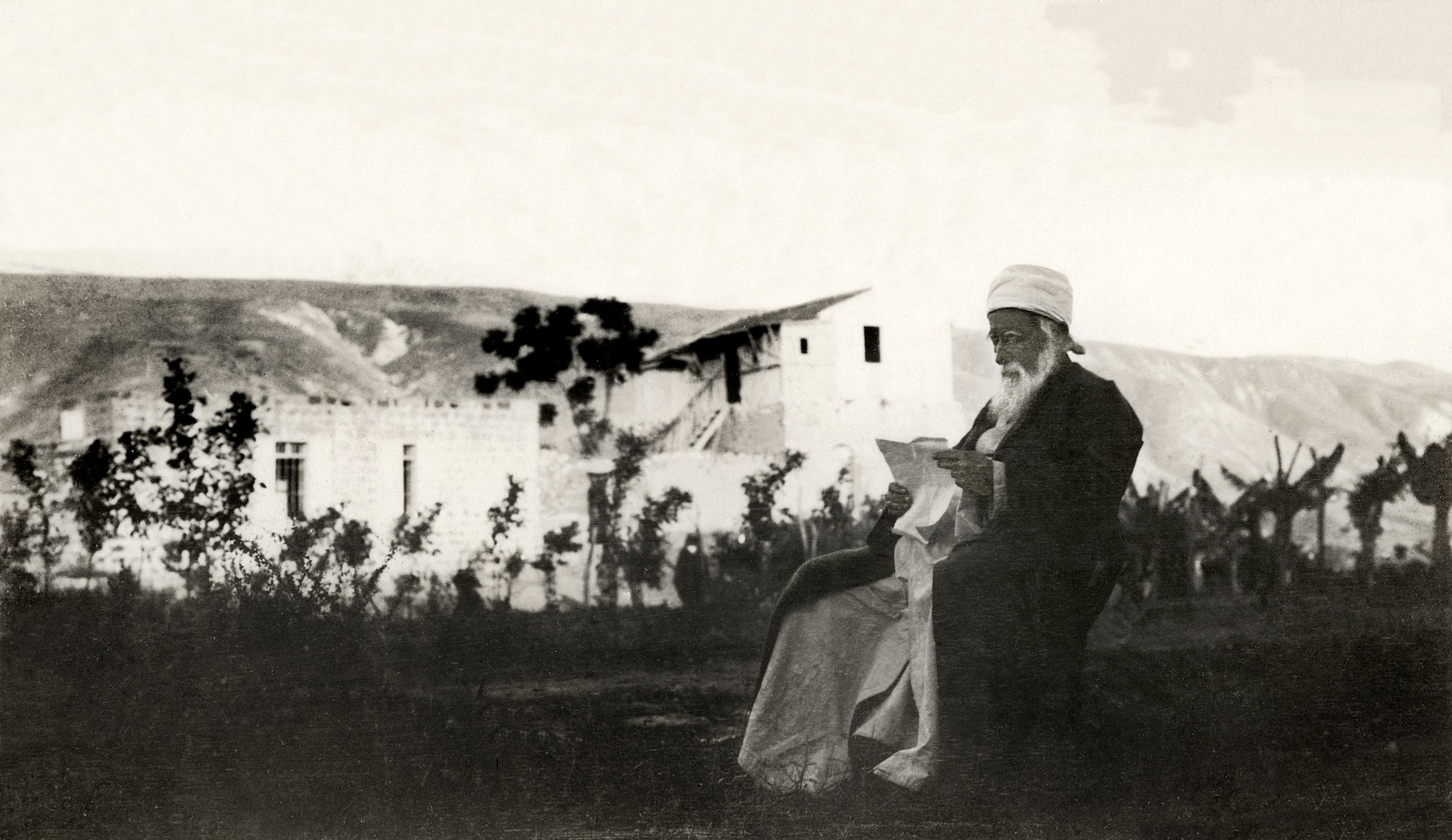
'Abdu'l-Bahá in perfect health and hard at work in the Holy Land, around 1919-1921. Source: Bahá'í Media Bank, © Bahá'í International Community 2023.
The fourth reason that Shoghi Effendi left for Oxford when he did was that his adored Grandfather 'Abdu'l-Bahá was in excellent physical health, despite being 76 years old. The strains of the war on His health had eased, and His health had steadily improved.
When Major Tudor Pole had come to visit 'Abdu'l-Bahá, as soon as he could after the war in November 1918 he had been deeply impressed with 'Abdu'l-Bahá’s health and had written:
…the Master is vigorous and more healthy than when He was in London.
Everyone felt 'Abdu'l-Bahá was in the best health they had ever seen, healthier even than seven years prior. Shoghi Effendi attested to the Master’s wellbeing in two letters. The first dated 25 April 1919:
The Beloved is in perfect health, strong and vigorous, happy and joyous and often does he wake up at midnight in order to peruse the contents that are being received from the East as well as the West.
And the second, four months later, in August 1919:
The Beloved Master, is indeed in the best of health, physically strong, ever active, revealing hundreds of Tablets a week, perusing innumerable supplications, receiving many visitors and pilgrims and often waking up at mid-night for meditation and prayer.
This is in great part why the sudden passing of 'Abdu'l-Bahá just one year and 10 months later would come as such an unbearable, tremendous shock to Shoghi Effendi.
Shoghi Effendi, and indeed the Holy Family, never saw it coming.
'Abdu'l-Bahá was strong, healthy, in great spirits, and as we will see in the next story, preparing His next grand adventure.
His doting grandson would have left for Oxford with no worries as far as the Master’s health was concerned.
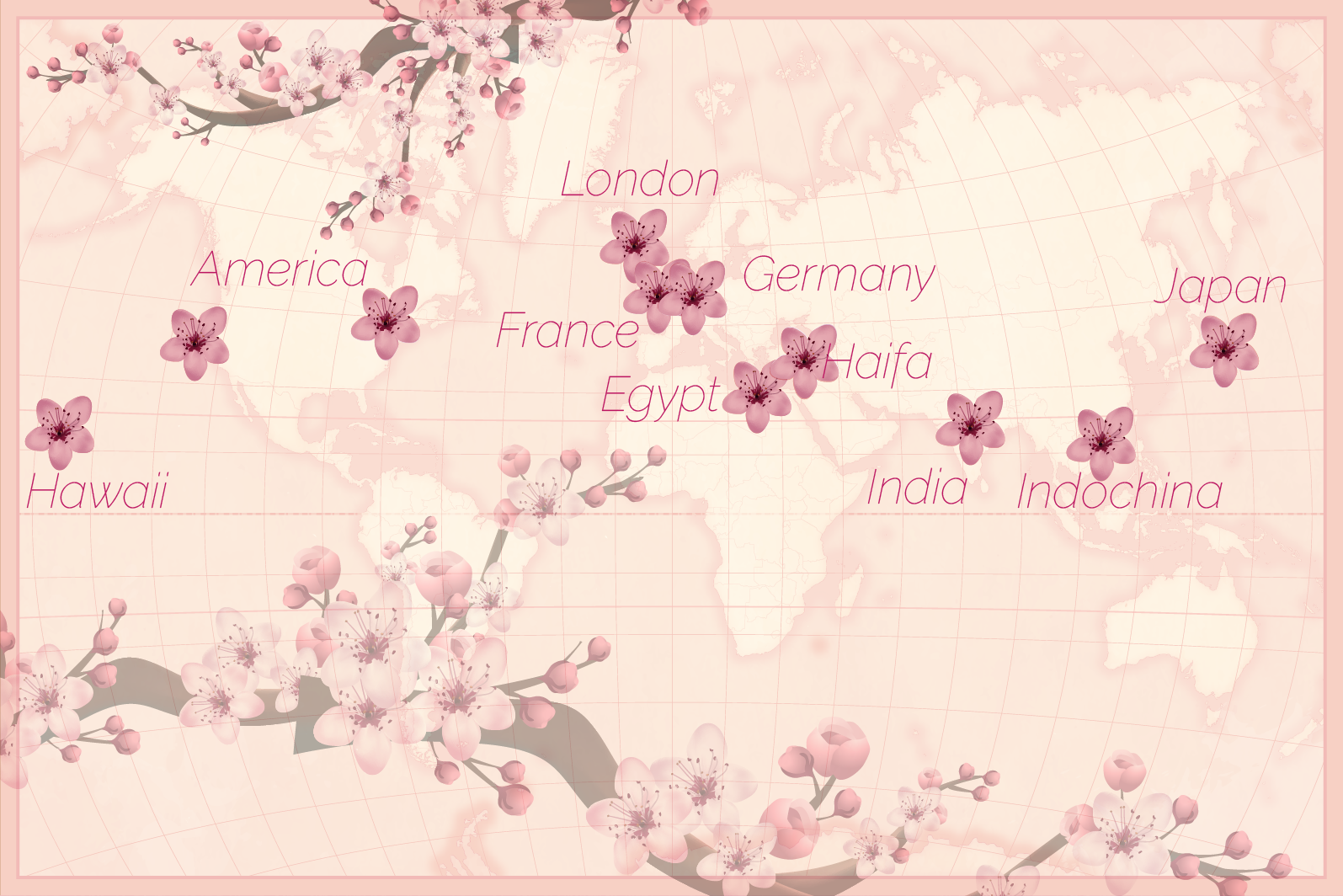
'Abdu'l-Bahá’s planned second worldwide journey to the east and west, to India, Vietnam, Japan, Hawaii, across the United States, to England, France, Germany and Egypt. Map © Violetta Zein,
By early 1920, 'Abdu'l-Bahá was planning another very long, very ambitious teaching journey to southeast Asia, America and Europe. Shoghi Effendi announced the Master’s plan to friends in England:
What is significant and alluring is the intimation of the Beloved himself that he is planning and thinking of such a journey across the Indian Ocean. He even declared that, God willing, he wishes to undertake a voyage to India, and thence to Indo-China, Japan and the Hawaiian Islands, from there across the American Continent to your beloved city of London, to France, Germany and Egypt. Oh! how fervent, how deep and how sincere is our hope that such a great journey which he himself has fixed its duration to be four or five years, will be undertaken. Let us hope and prepare for it.
And Shoghi Effendi also announced the plan to the Bahá'í friends in Burma:
The Beloved, has intimated of late his intention to travel to India and we hope this will be soon realized, and India, through the unity and energy of the friends, will acquire the capacity to receive him…
The joy and excitement, so palpable in these letters is deeply heart-breaking.
Shoghi Effendi was leaving Haifa for Oxford with in a perfectly serene state of mind, a clear conscience, and what is more, he was leaving making plans of his own, no doubt, to return in time to accompany 'Abdu'l-Bahá, finally, on an ambitious teaching and proclamation journey, an honor he had been so cruelly and unjustly deprived of when he was 15 years old, and had been turned back in Naples.
SOURCES FOR PART III
Shoghi Effendi – ‘Abdu’l-Bahá’s secretary, translator, and assistant
Riaz Khadem: Prelude to the Guardianship, pages 8, 17-19.
The Priceless Pearl, Rúḥíyyih Rabbání, Bahá’í Publishing Trust, London, 1969, pages 21-22.
Visiting ‘Abdu’l-Baha Volume 2: The Final Years, 1913–1921, Earl Redman, Kindle Edition.
19 November 1918: The Era of Service
The Priceless Pearl, Rúḥíyyih Rabbání, Bahá’í Publishing Trust, London, 1969, pages 26-27.
Iraj Poostchi. 2010. ‘Adasiyyah: A Study in Agriculture and Rural Development. Baha’i Studies Review 16, p 76.
26 December 1918: Shoghi Effendi’s thrilling life in Haifa
Blessings Beyond Measure: Recollections of ‘Abdu’l-Bahá and Shoghi Effendi. ‘Alí M Yazdí. Bahá’í Publishing Trust, 1988, pages 61-62.
January 1919: The tremendous volume of work
The Priceless Pearl, Rúḥíyyih Rabbání, Bahá’í Publishing Trust, London, 1969, page 28.
1918 – 1920: Shoghi Effendi accompanies ‘Abdu’l-Bahá to official functions
The Priceless Pearl, Rúḥíyyih Rabbání, Bahá’í Publishing Trust, London, 1969, page 28.
1918 – 1920: Constant companionship
The Priceless Pearl, Rúḥíyyih Rabbání, Bahá’í Publishing Trust, London, 1969, pages 28-29.
8 February 1919: Shoghi Effendi’s first diary letter to Star of the West Volume 10, Issue 11
Star of the West, Volume 10, Issue 11, 27 September 1919.
Star of the West, Volume 10, Issue 11, 27 September 1919.
10 February 1919: The Haifa Relief Fund
The Priceless Pearl, Rúḥíyyih Rabbání, Bahá’í Publishing Trust, London, 1969, pages 28-29.
Star of the West, Volume 10, Issue 11, 27 September 1919.Annamarie Honnold, Vignettes from the Life of ‘Abdu’l-Bahá, p. 77.
Hasan M. Balyúzí: ‘Abdu’l-Bahá: The Centre of the Covenant of Bahá’u’lláh, page 435.
Star of the West, Volume 10, Issue 11, 27 September 1919.
Star of the West, Volume 10, Issue 11, 27 September 1919.
Arches over the Years. Marzieh Gail, George Ronald, 1991, Chapter 18.
13 February 1919: Ḥájí Muḥammad Yazdí’s pilgrimage
Blessings Beyond Measure: Recollections of ‘Abdu’l-Bahá and Shoghi Effendi. ‘Alí M Yazdí. Bahá’í Publishing Trust, 1988, pages 63-64.
18 February 1919: In Bahjí with ‘Abdu’l-Bahá
The Priceless Pearl, Rúḥíyyih Rabbání, Bahá’í Publishing Trust, London, 1969, pages 29-30.
April 1919: The long and dismal years of war
The Priceless Pearl, Rúḥíyyih Rabbání, Bahá’í Publishing Trust, London, 1969, page 26.
Star of the West Volume 10, Issue 6, 24 June 1919.
Star of the West Volume 10, Issue 7, 13 July 1919.
Violetta Zein, The Extraordinary Life of ‘Abdu’l-Bahá: The illustrated chronology of the life of ‘Abdu’l-Bahá Part VIII.
The supplication of 1,500 American Bahá’ís
Star of the West Volume 10, Issue 8, 1 August 1919.
Star of the West Volume 10, Issue 8, 1 August 1919.
24 August 1919: ‘Abdu’l-Bahá and Shoghi Effendi work at all hours
Blessings Beyond Measure: Recollections of ‘Abdu’l-Bahá and Shoghi Effendi. ‘Alí M Yazdí. Bahá’í Publishing Trust, 1988, pages 64-67.
Summer 1919: All of Shoghi Effendi’s’ friends leave
Blessings Beyond Measure: Recollections of ‘Abdu’l-Bahá and Shoghi Effendi. ‘Alí M Yazdí. Bahá’í Publishing Trust, 1988, pages 64-67.
Late summer 1919: ‘Alí Yazdí leaves Haifa for his university studies in Germany
Blessings Beyond Measure: Recollections of ‘Abdu’l-Bahá and Shoghi Effendi. Ali M Yazdí, Bahá’í Publishing Trust, 1988, page 42.
The Bahá’í Faith: The official website of the worldwide Bahá’í community: Memories of ‘Abdu’l-Bahá, ‘Alí Yazdí.
Bahaipedia: Ḥájí Muḥammad Yazdí.
27 September 1919: Shoghi Effendi: Grandson of ‘Abdu’l-Bahá
The Priceless Pearl, Rúḥíyyih Rabbání, Bahá’í Publishing Trust, London, 1969, pages 27-28.
5 November 1919 – 23 January 1920: Bahá’u’lláh and the New Era
John E. Esslemont, Bahá’u’lláh and the New Era.
Moojan Momen, M.A.M.B., Dr. John Ebenezer Esslemont, M.B., Ch.B., SBEA: Hand of the Cause of God, pages 1-40.
Bahaipedia: John Esslemont.
Earl Redman, Visiting ‘Abdu’l-Bahá Volume 2: The Final Years, 1913-1921, Kindle Edition.
9 December 1919: Shoghi Effendi’s letter to ‘Alí Yazdí in Germany
Blessings Beyond Measure: Recollections of ‘Abdu’l-Bahá and Shoghi Effendi. ‘Alí M Yazdí. Bahá’í Publishing Trust, 1988, page 70.
17 December 1919: Shoghi Effendi’s busy life in Haifa
Blessings Beyond Measure: Recollections of ‘Abdu’l-Bahá and Shoghi Effendi. ‘Alí M Yazdí. Bahá’í Publishing Trust, 1988, pages 71-72.
January 1920 – ‘Abdu’l-Bahá’s car
The Priceless Pearl, Rúḥíyyih Rabbání, Bahá’í Publishing Trust, London, 1969, page 29.
Earl Redman, Visiting ‘Abdu’l-Baha Volume 2: The Final Years, 1913–1921.
Reflections on the Bahai Writings: The Master’s Car (The Cunningham).
Early 1920: Shoghi Effendi and ‘Abdu’l-Bahá in ‘Adasiyyíh
‘Adasiyyah: A Study in Agriculture and Rural Development, Iraj Poostchi Baha’i Studies Review, Volume 16, Number 1, 1 April 2010, pp. 61-105(45).
The Priceless Pearl, Rúḥíyyih Rabbání, Bahá’í Publishing Trust, London, 1969, pages 13 and 30.
Violetta Zein, The Extraordinary Life of ‘Abdu’l-Bahá Part VIII: Return to the Holy Land
Early 1920: ‘Abdu’l-Bahá’s perfect health
The Priceless Pearl, Rúḥíyyih Rabbání, Bahá’í Publishing Trust, London, 1969, pages 13 and 30.
Violetta Zein, The Extraordinary Life of ‘Abdu’l-Bahá Part VIII: Return to the Holy Land.
Early 1920: ‘Abdu’l-Bahá’s planned trip to Asia
The Priceless Pearl, Rúḥíyyih Rabbání, Bahá’í Publishing Trust, London, 1969, pages 30-31.
![]()
 PHOTOGRAPH: End October 1918: The first photograph of 'Abdu'l-Bahá after World War I
PHOTOGRAPH: End October 1918: The first photograph of 'Abdu'l-Bahá after World War I




















